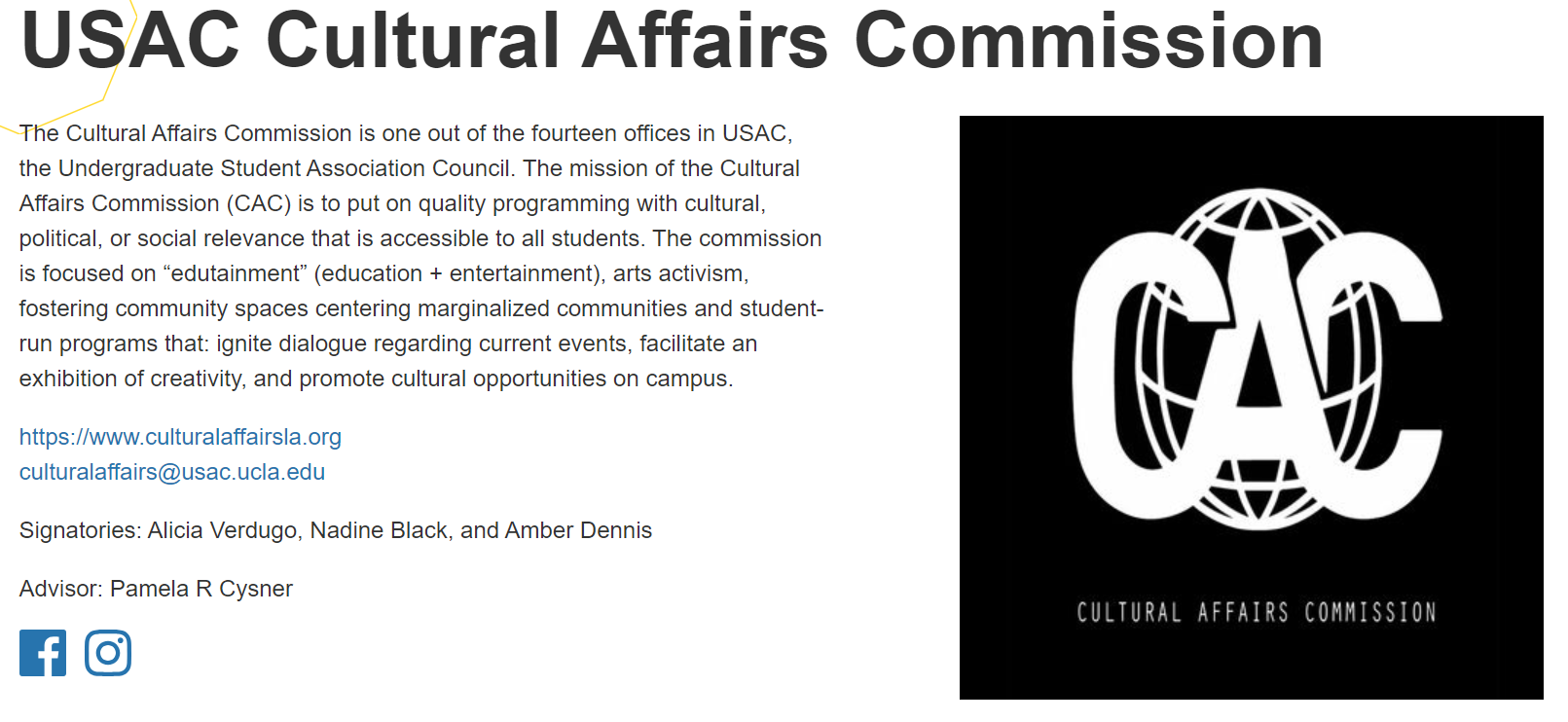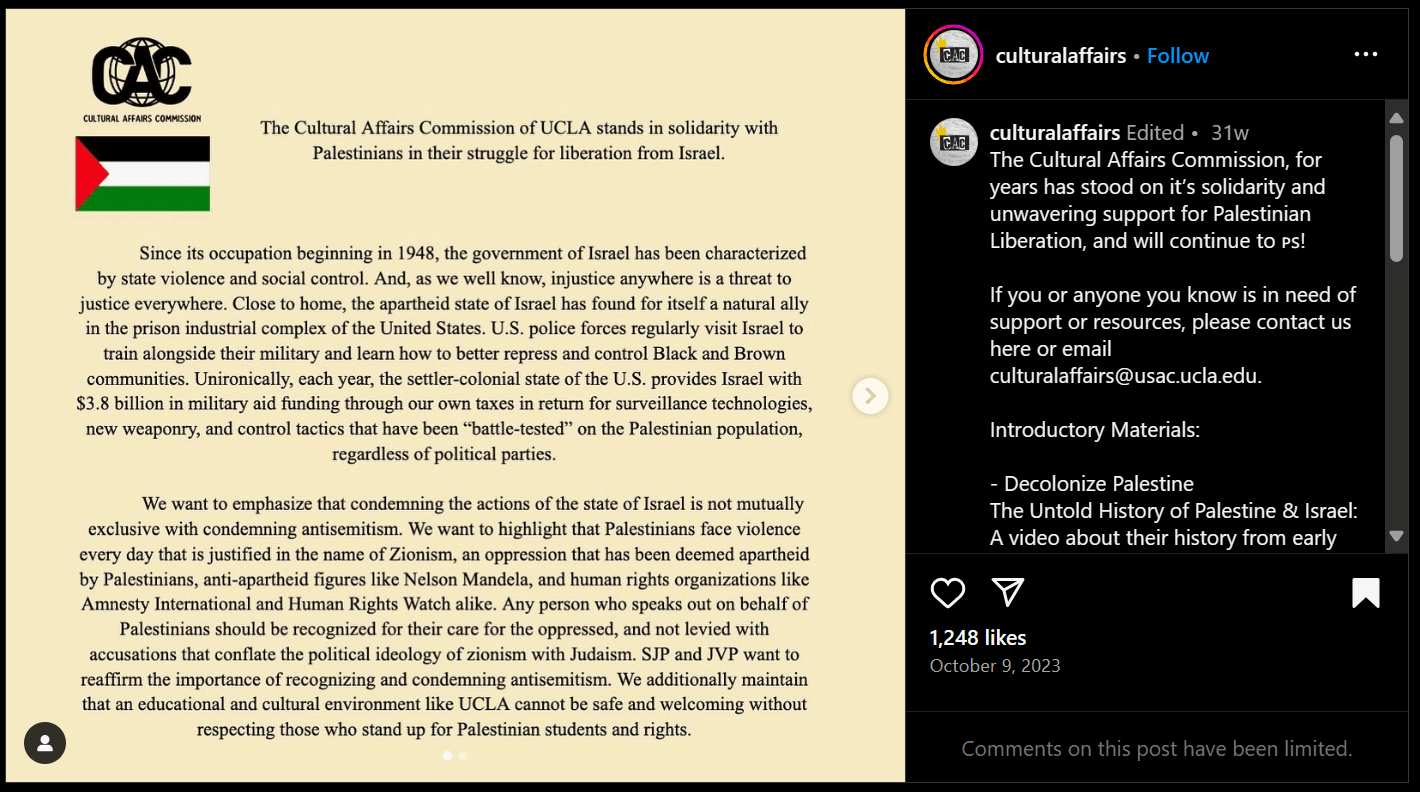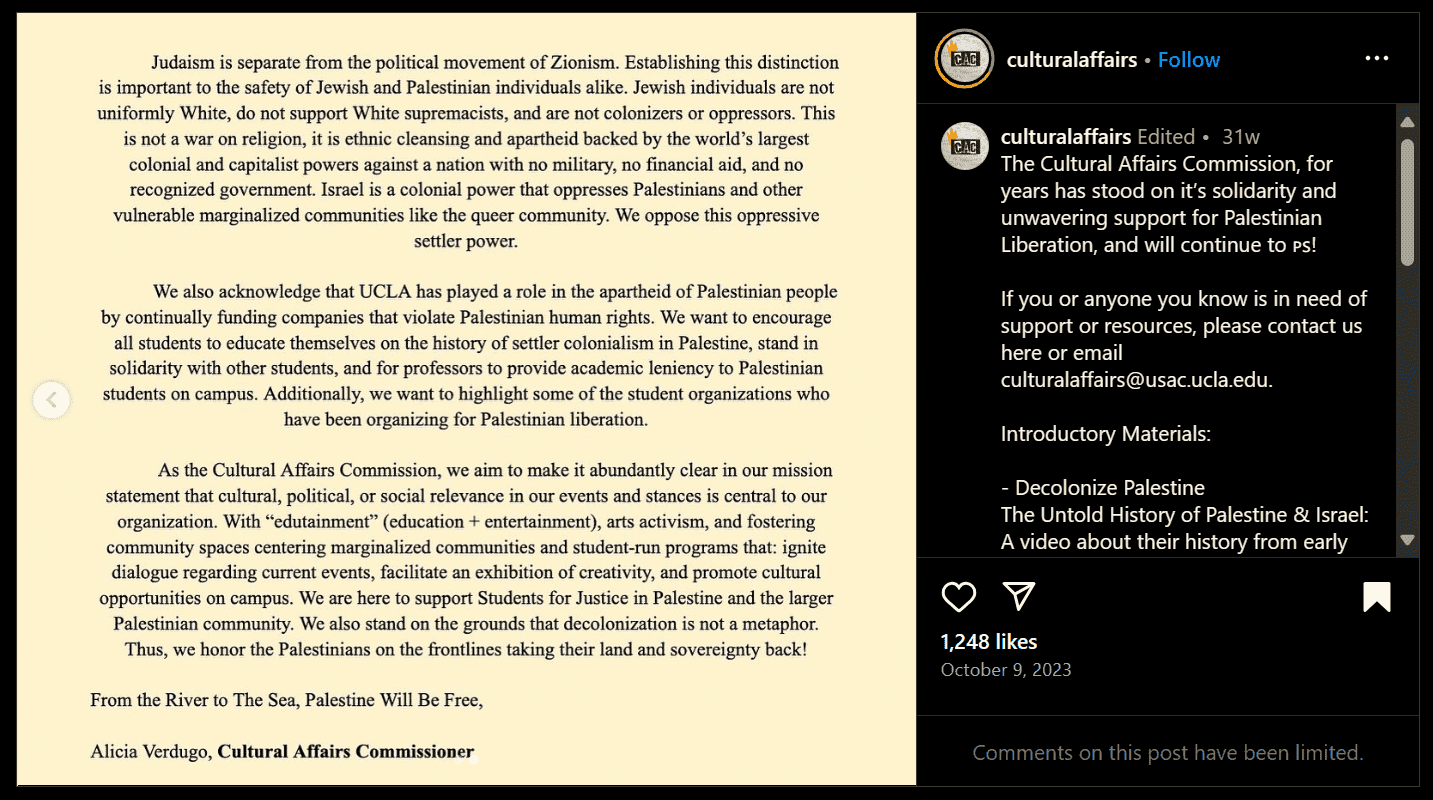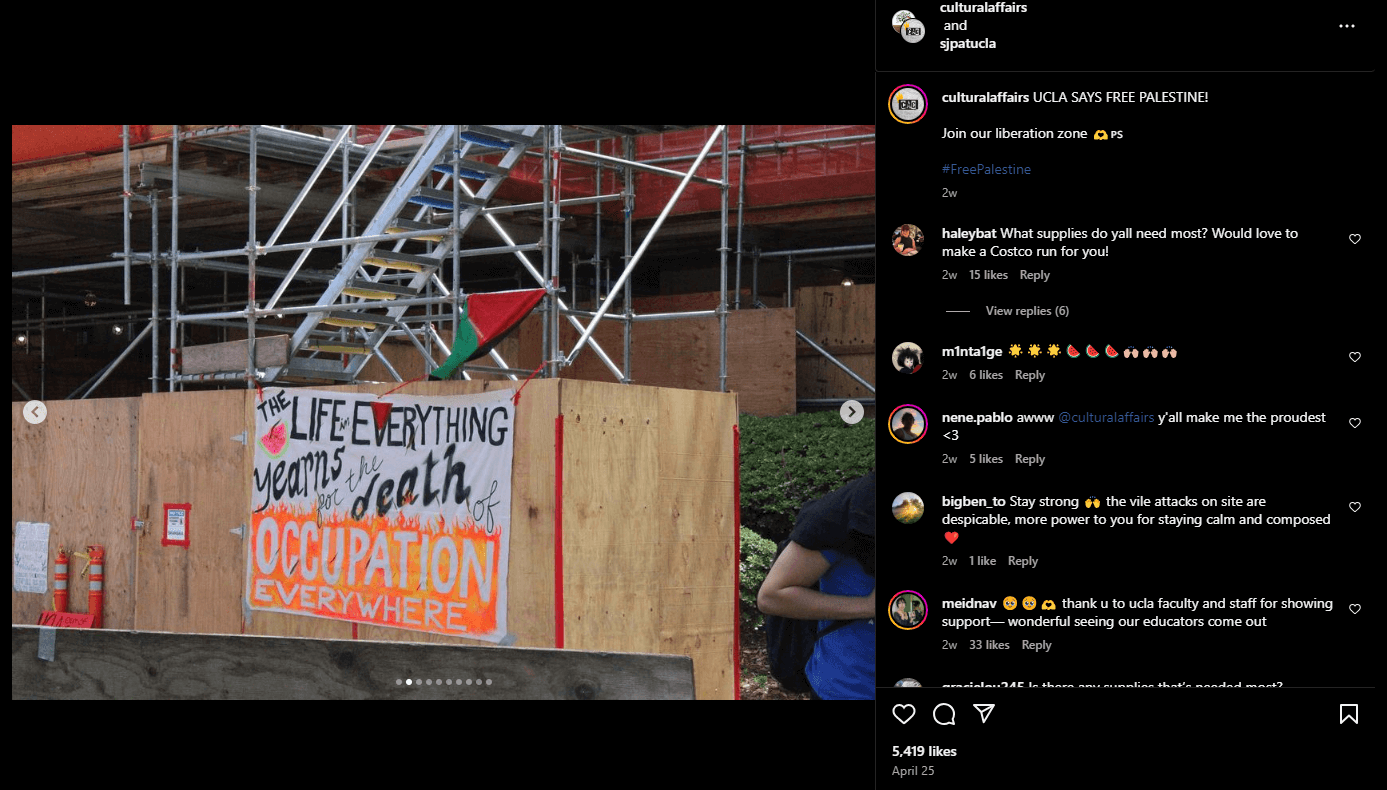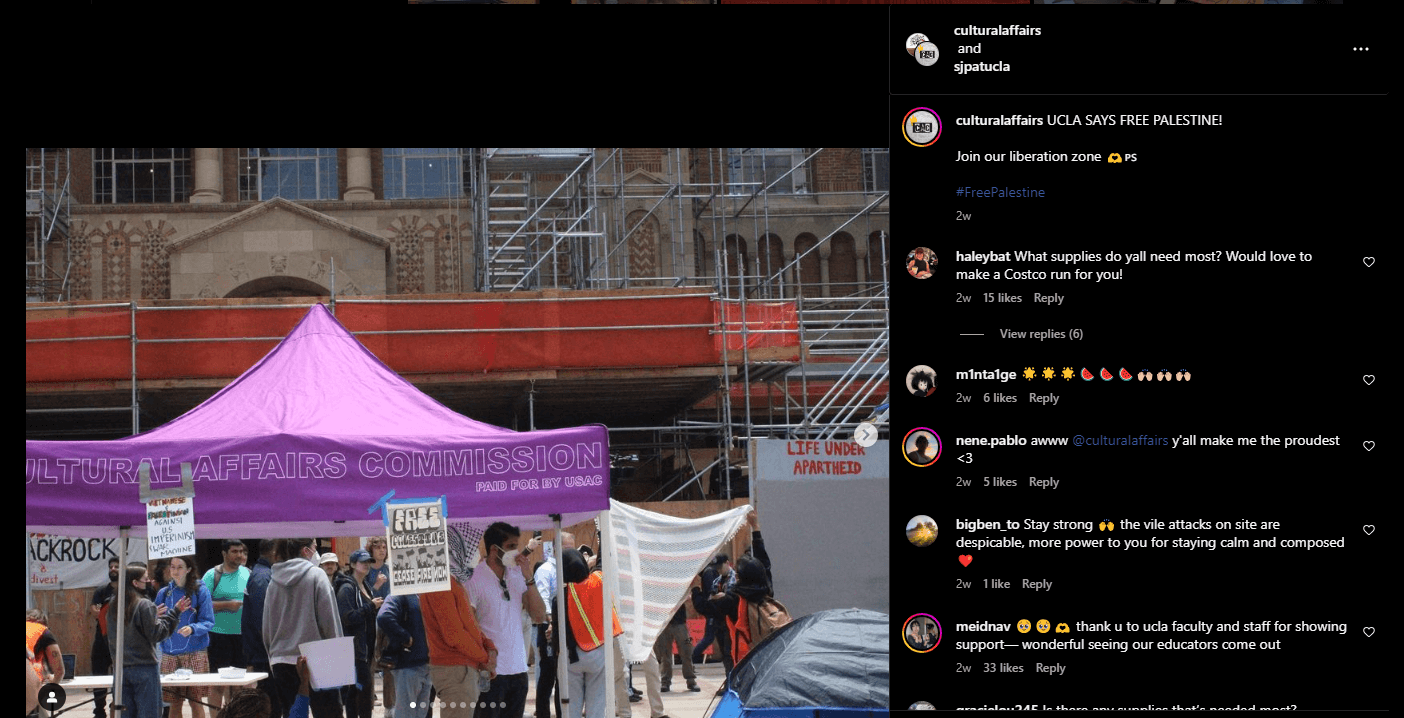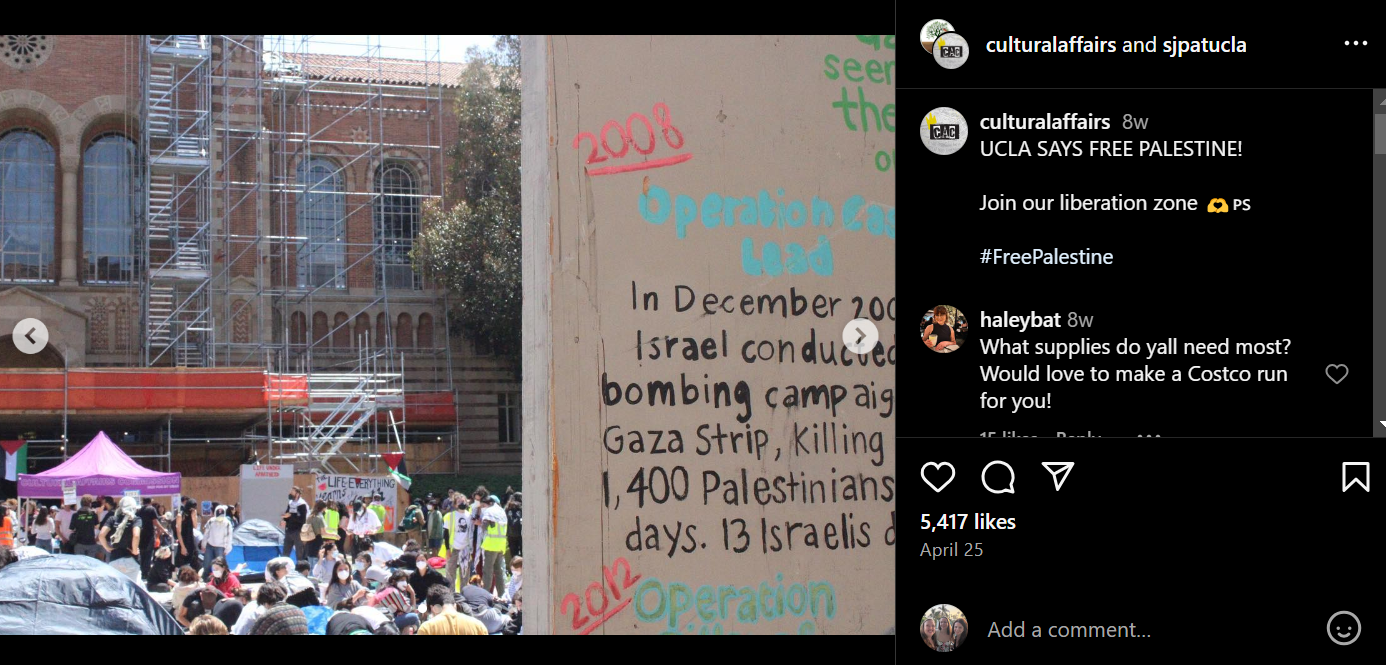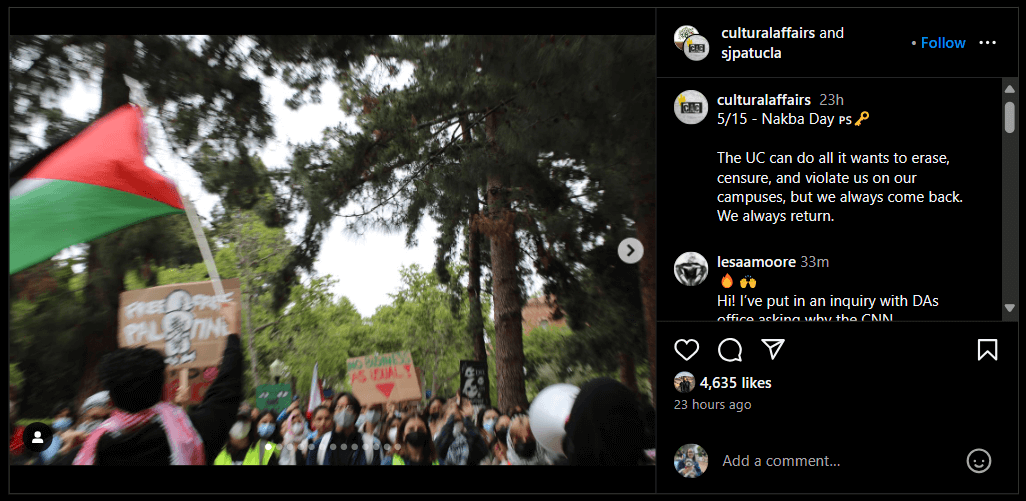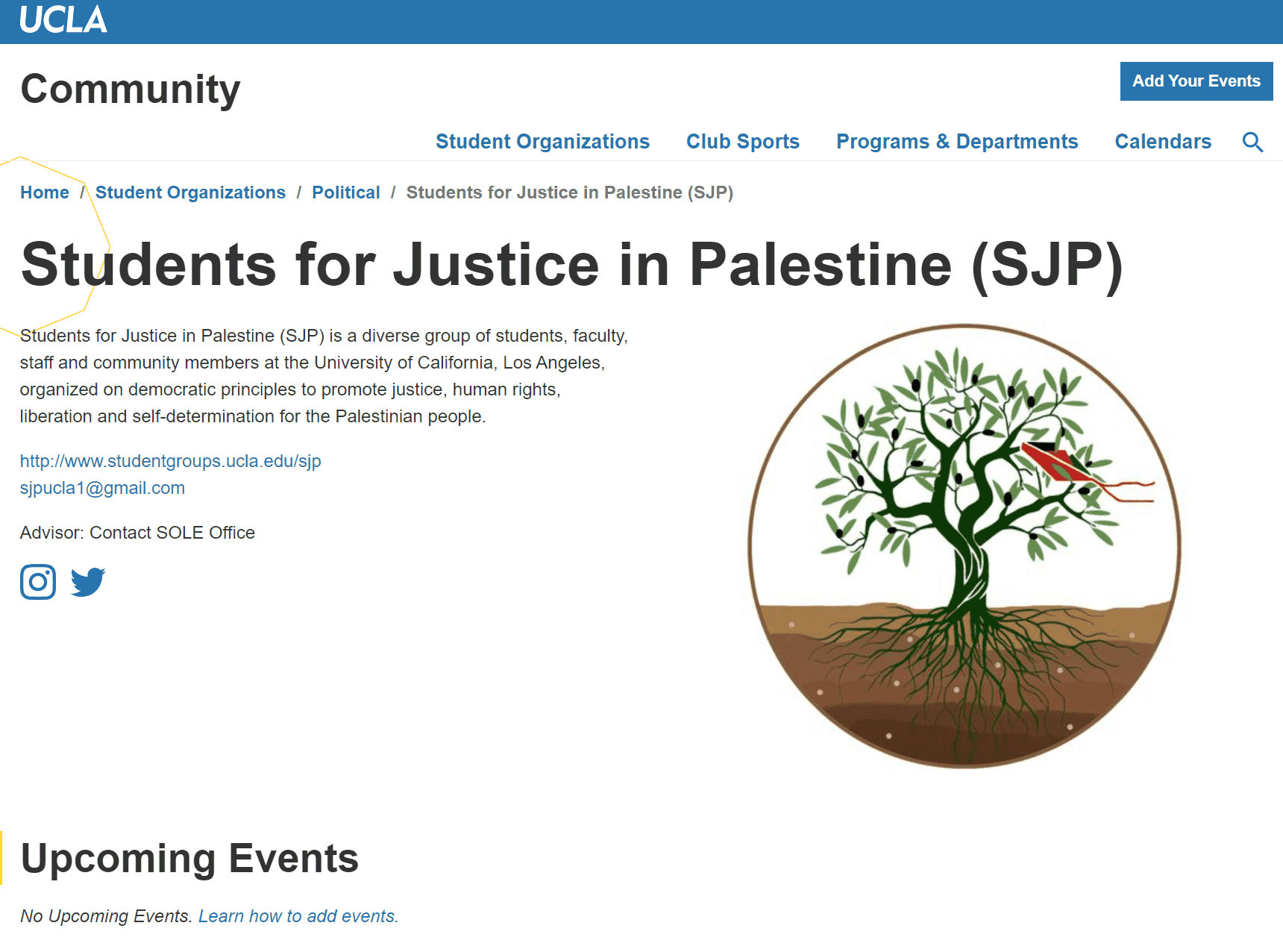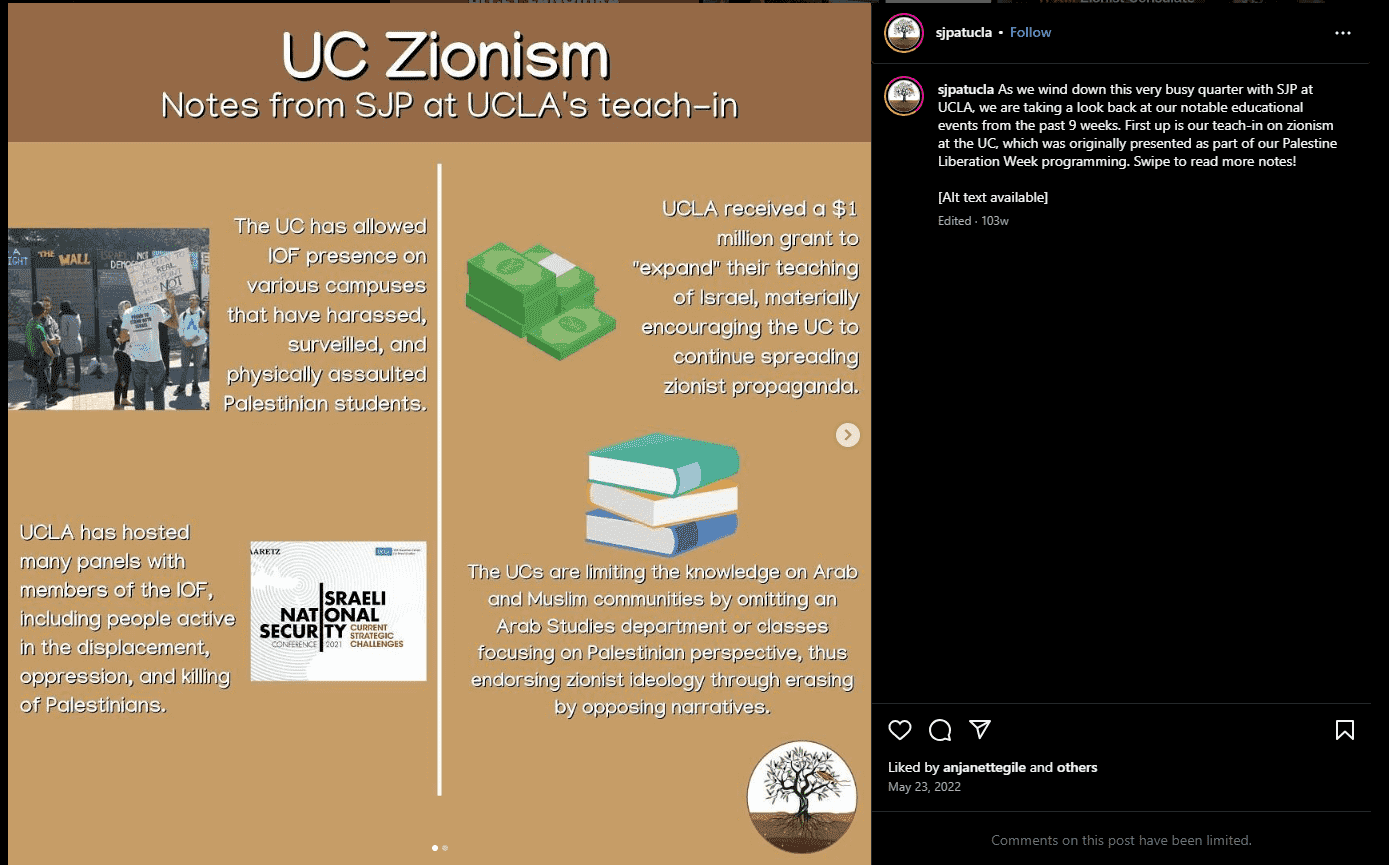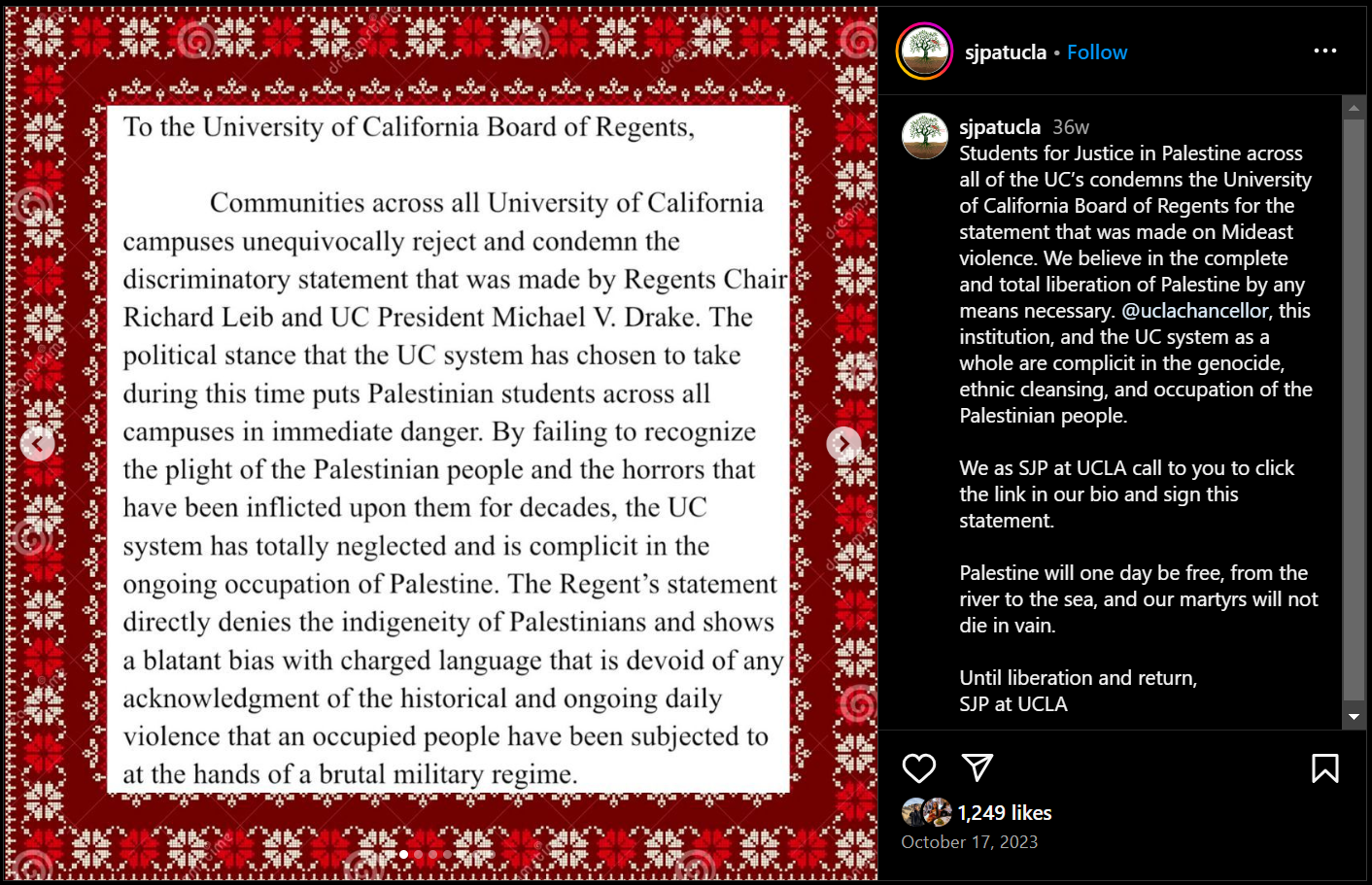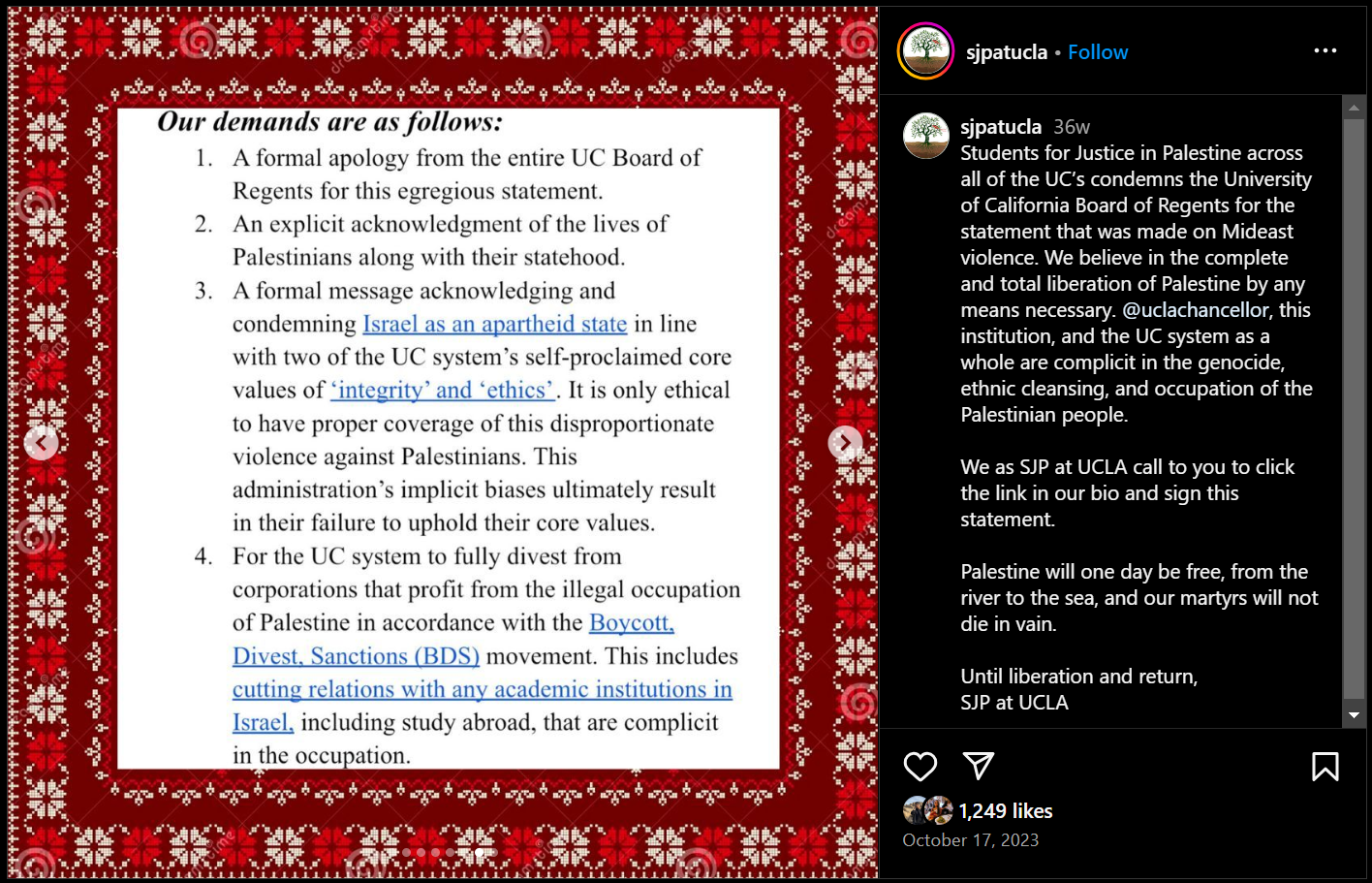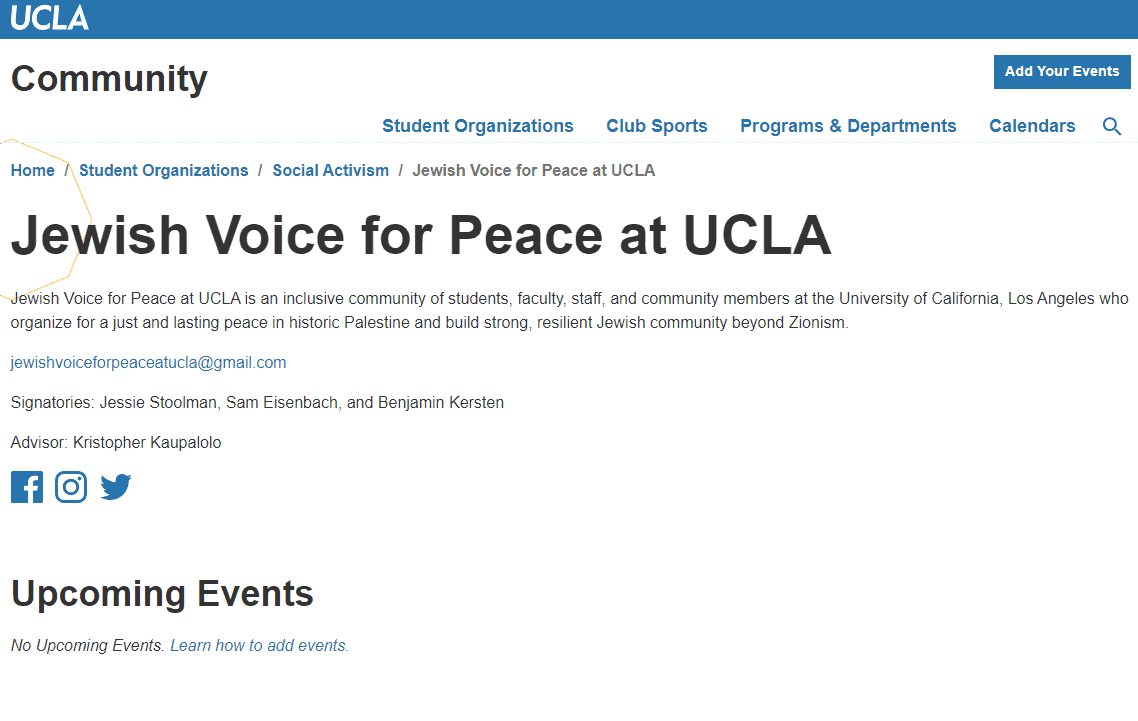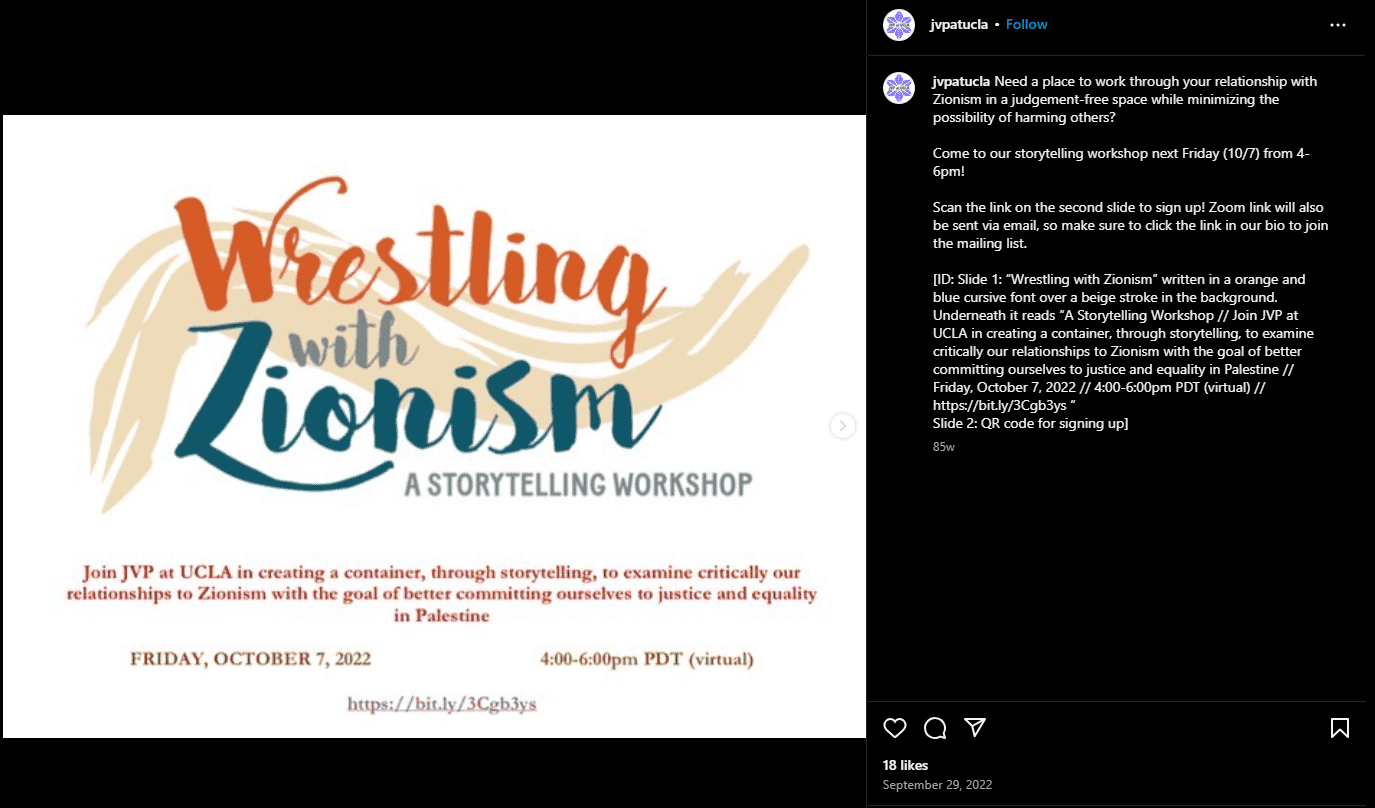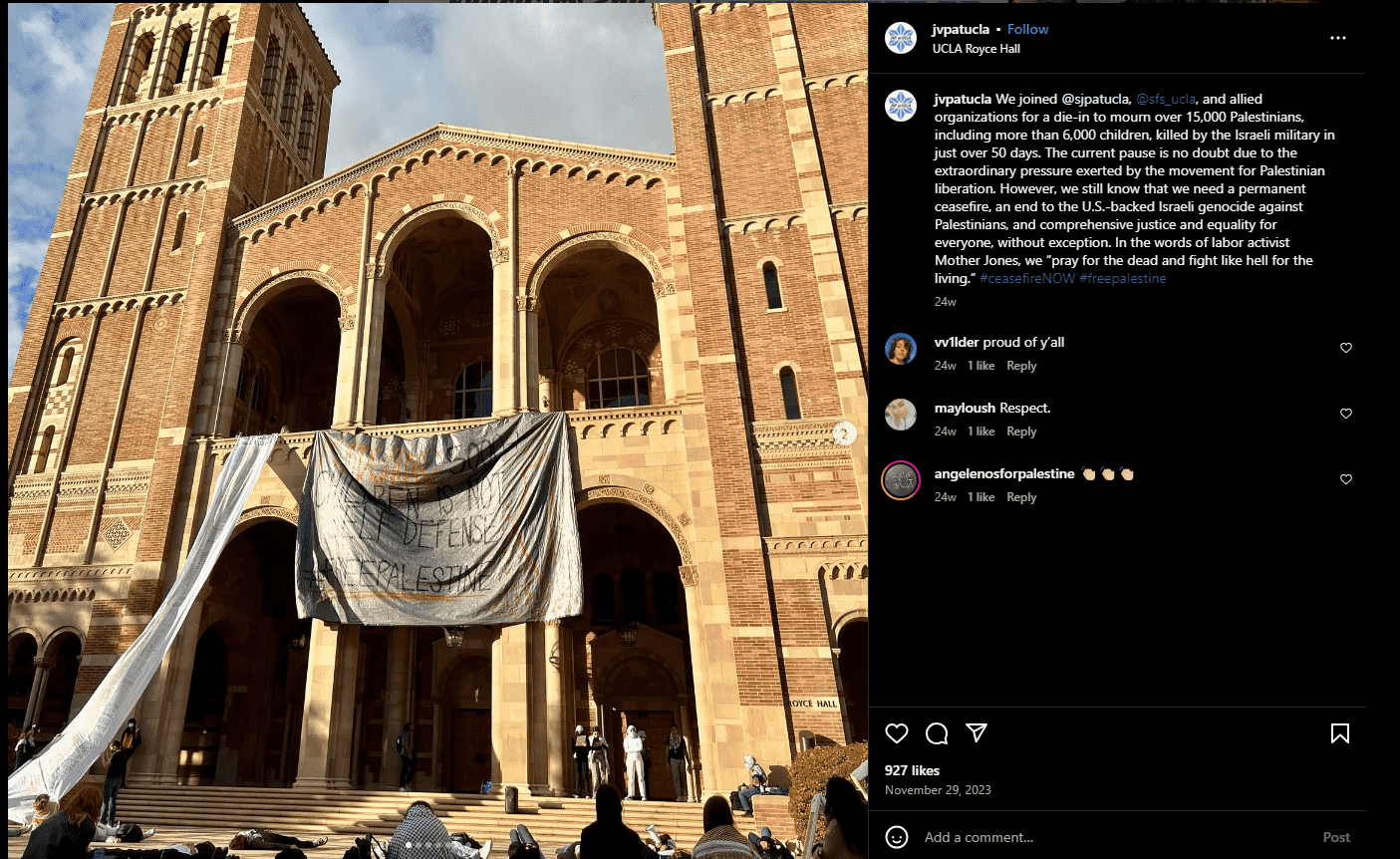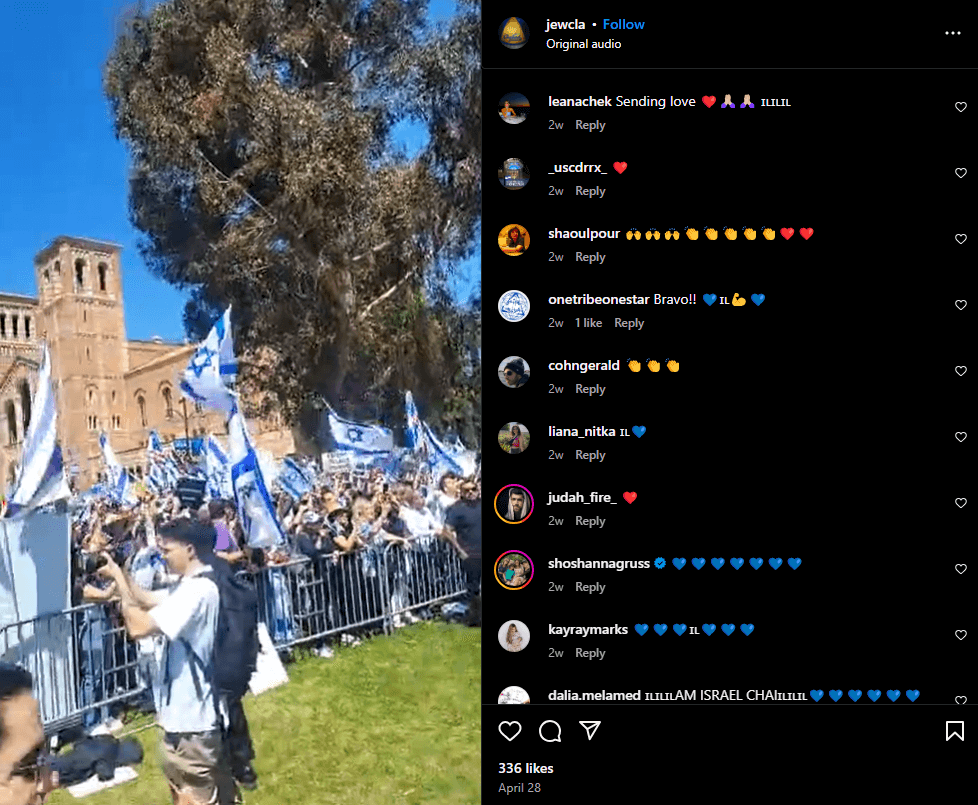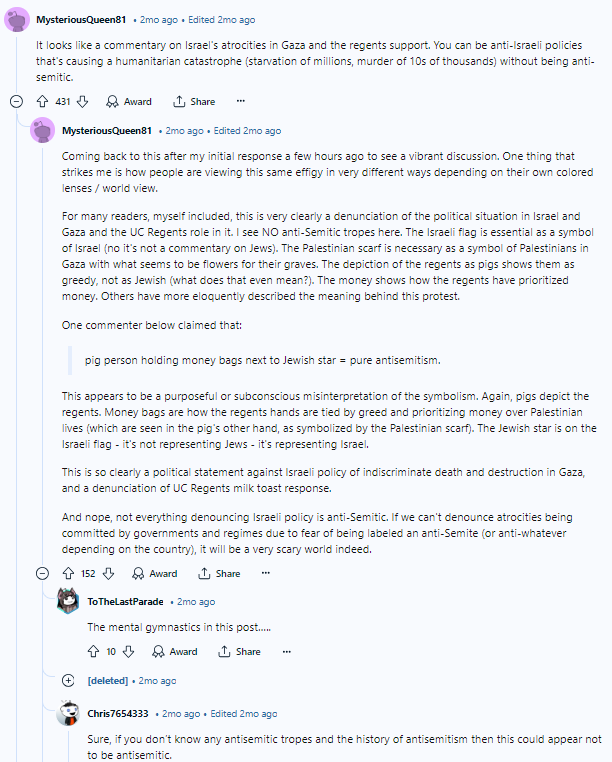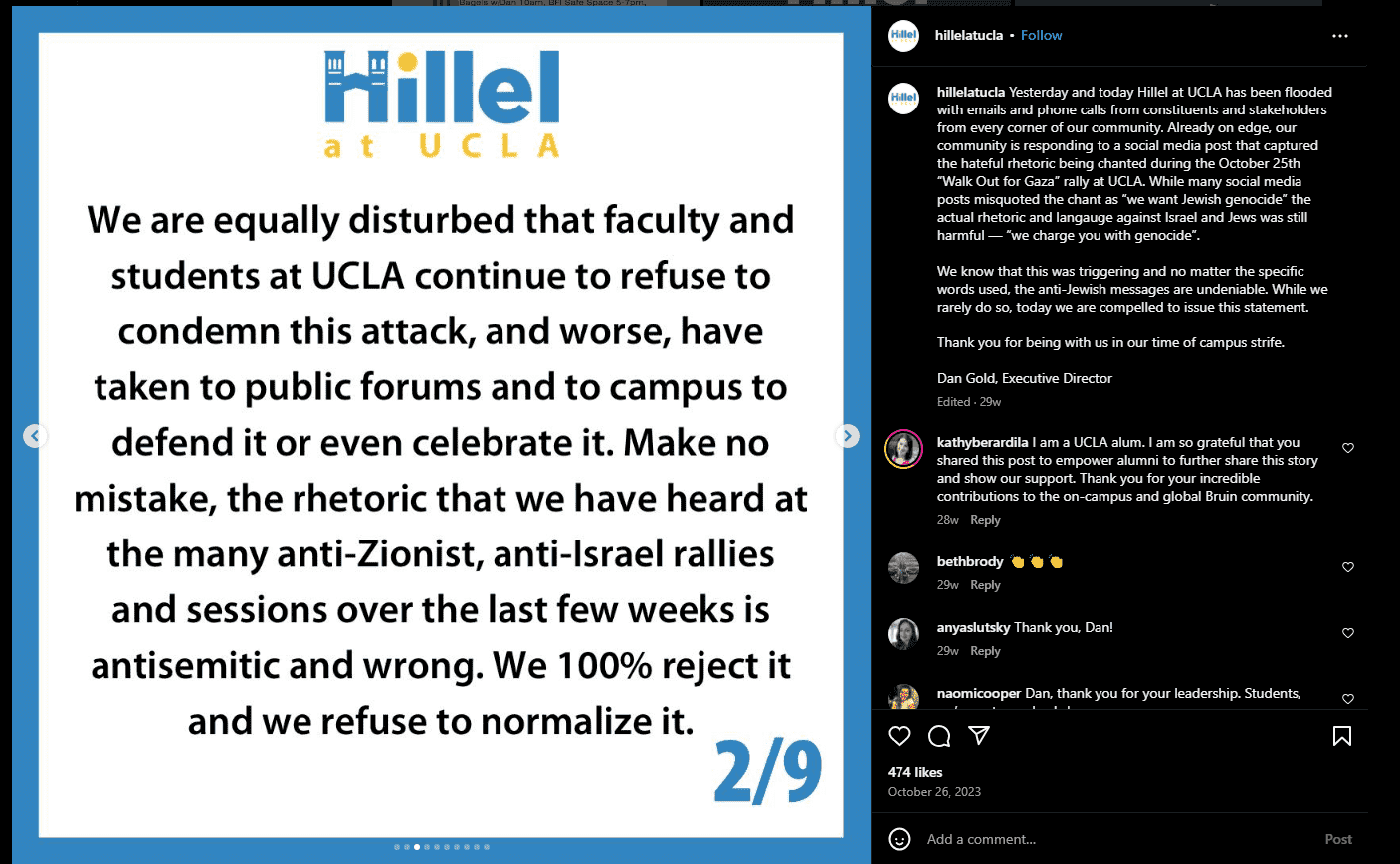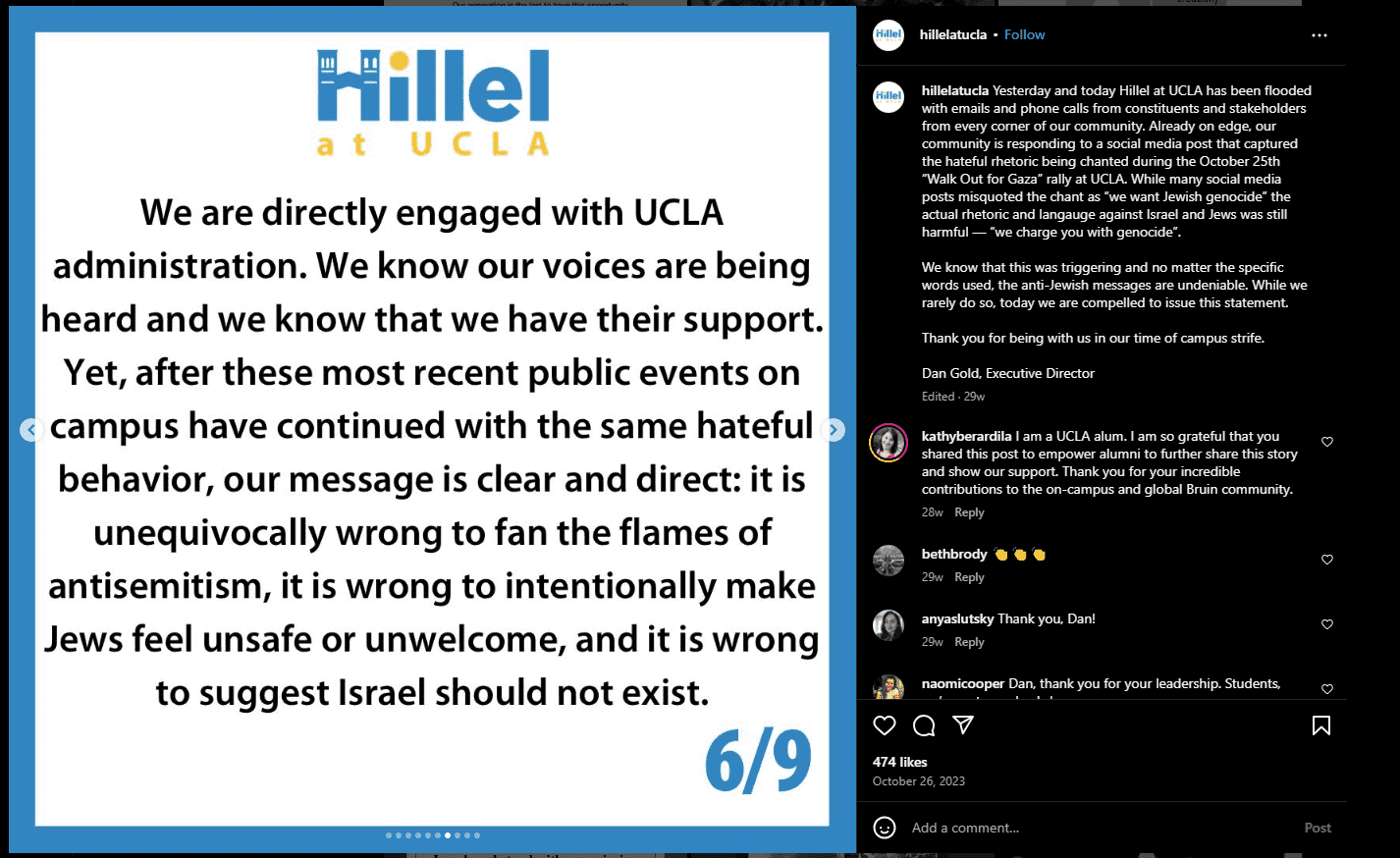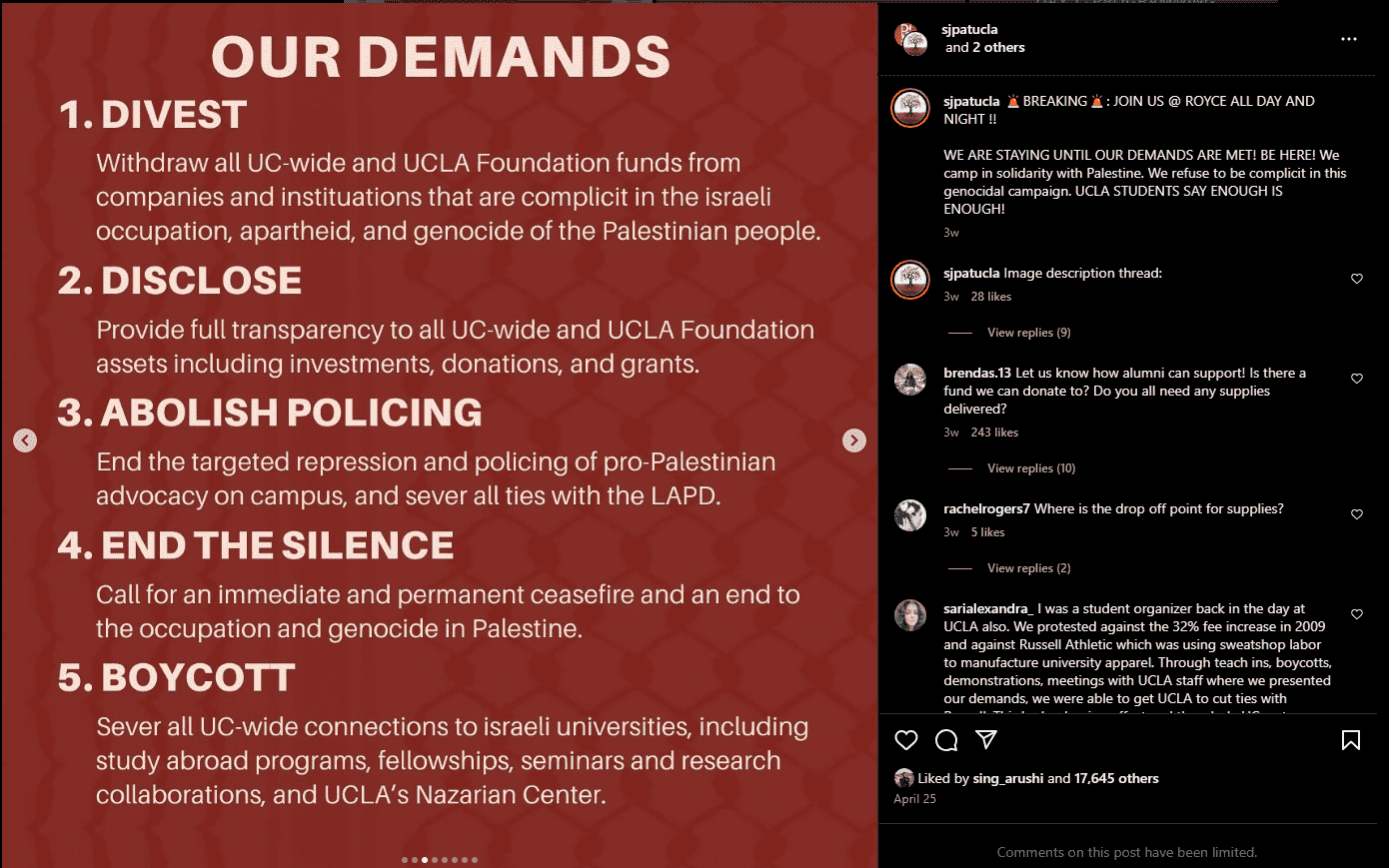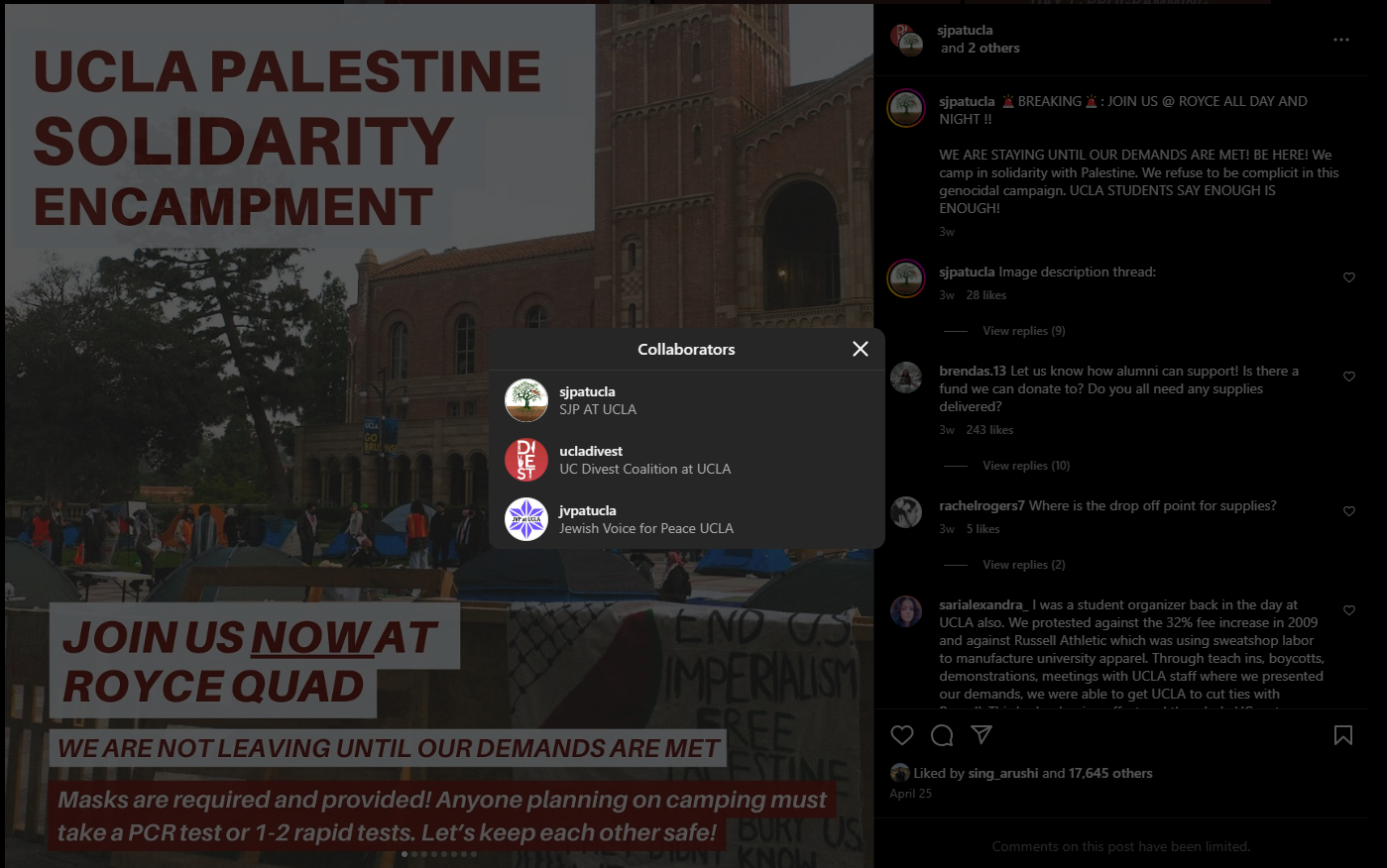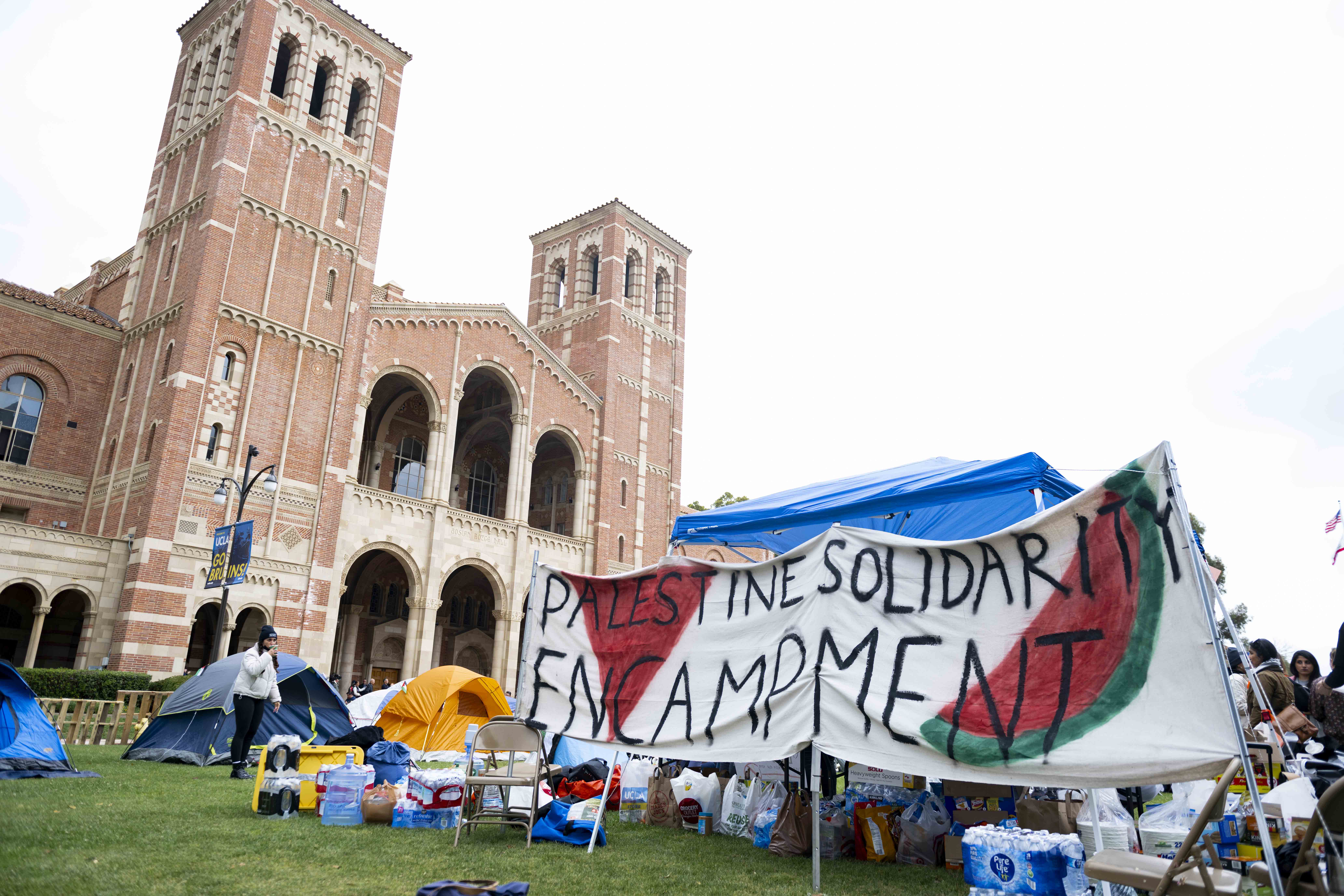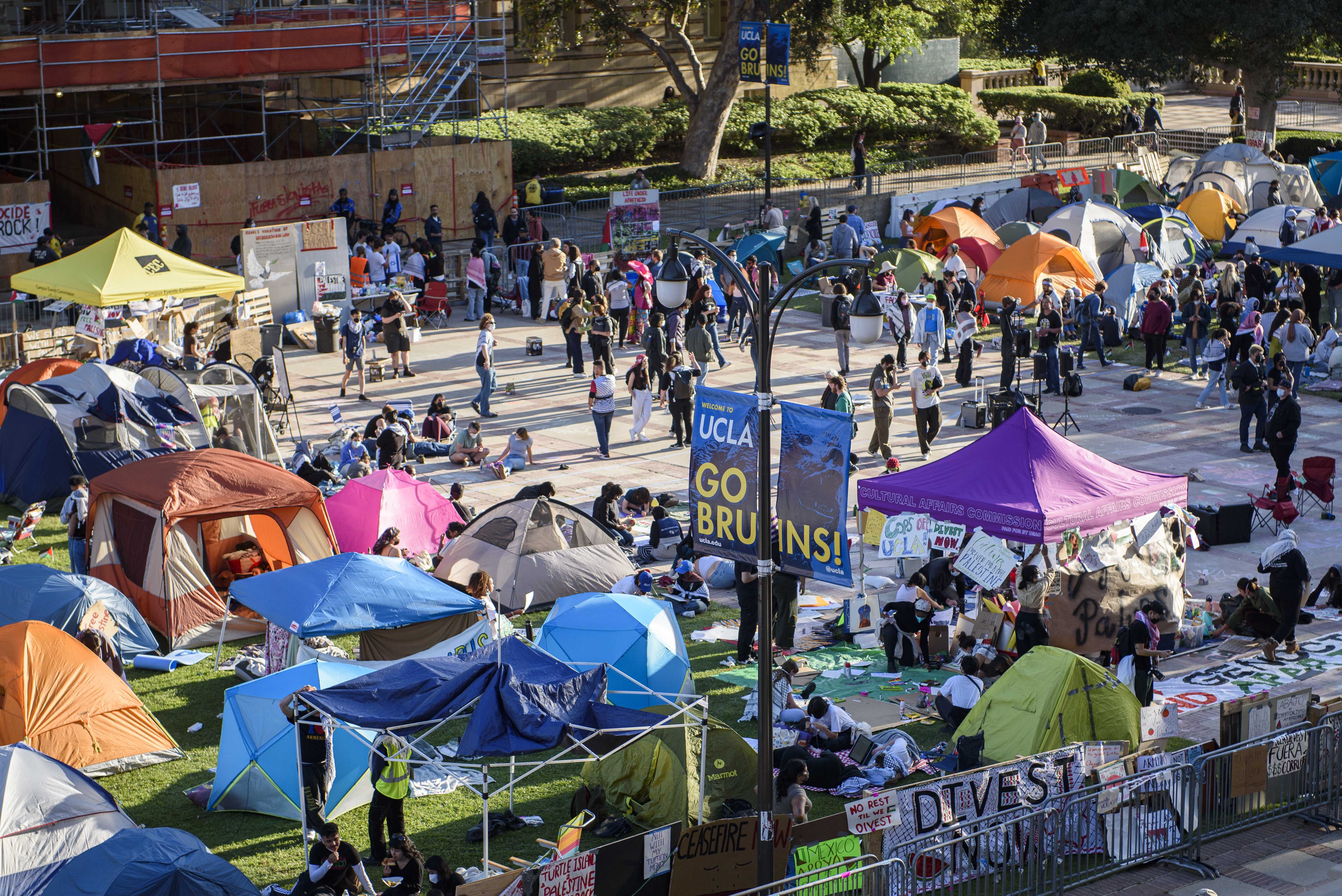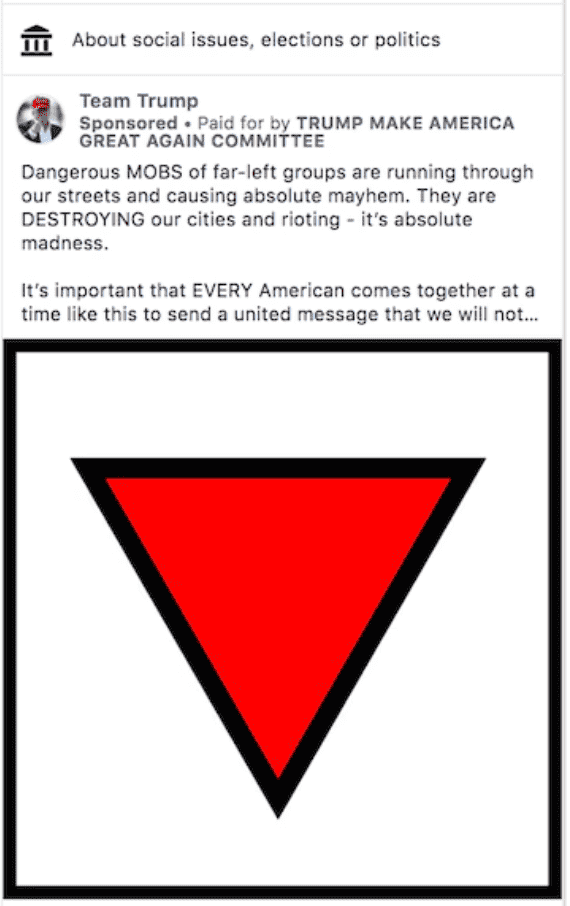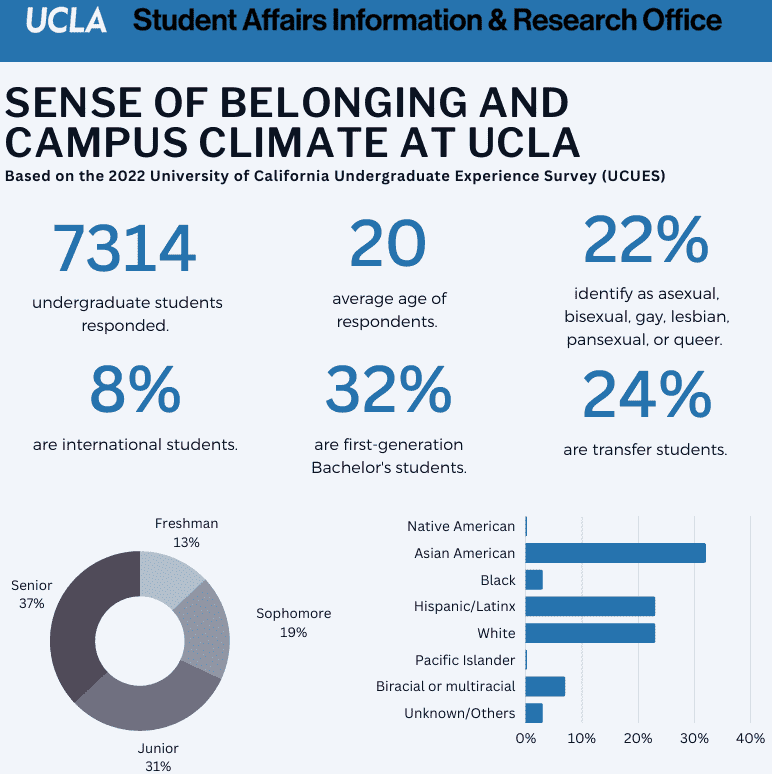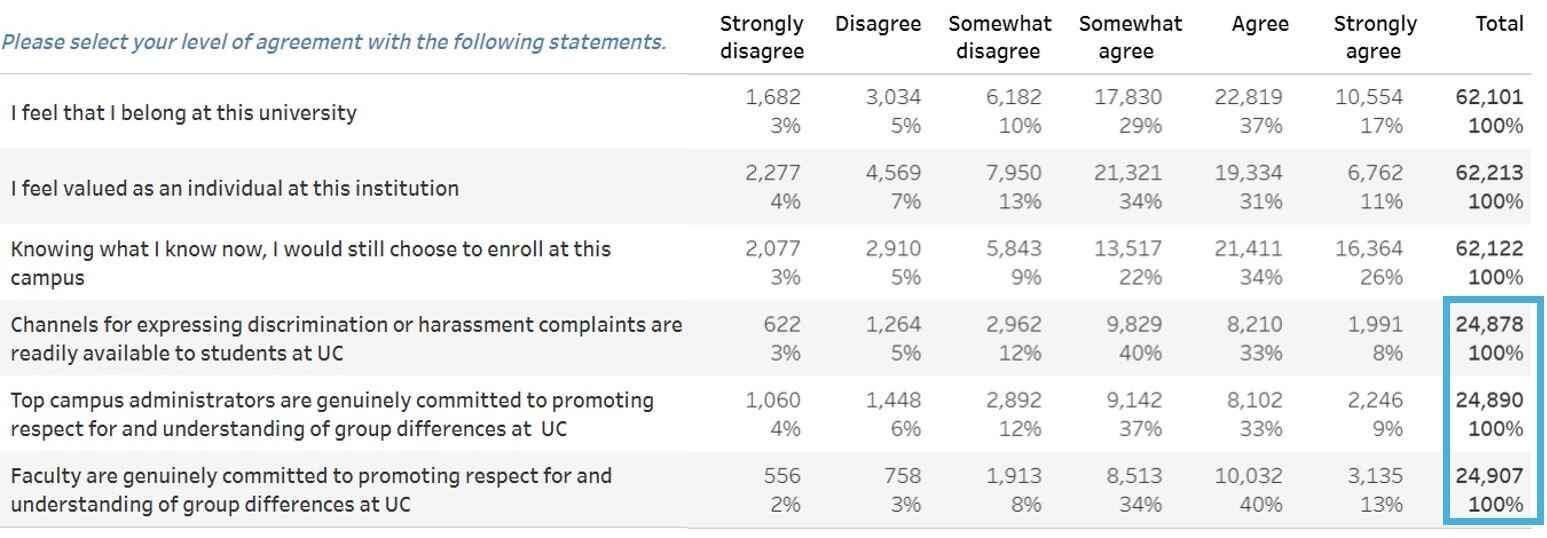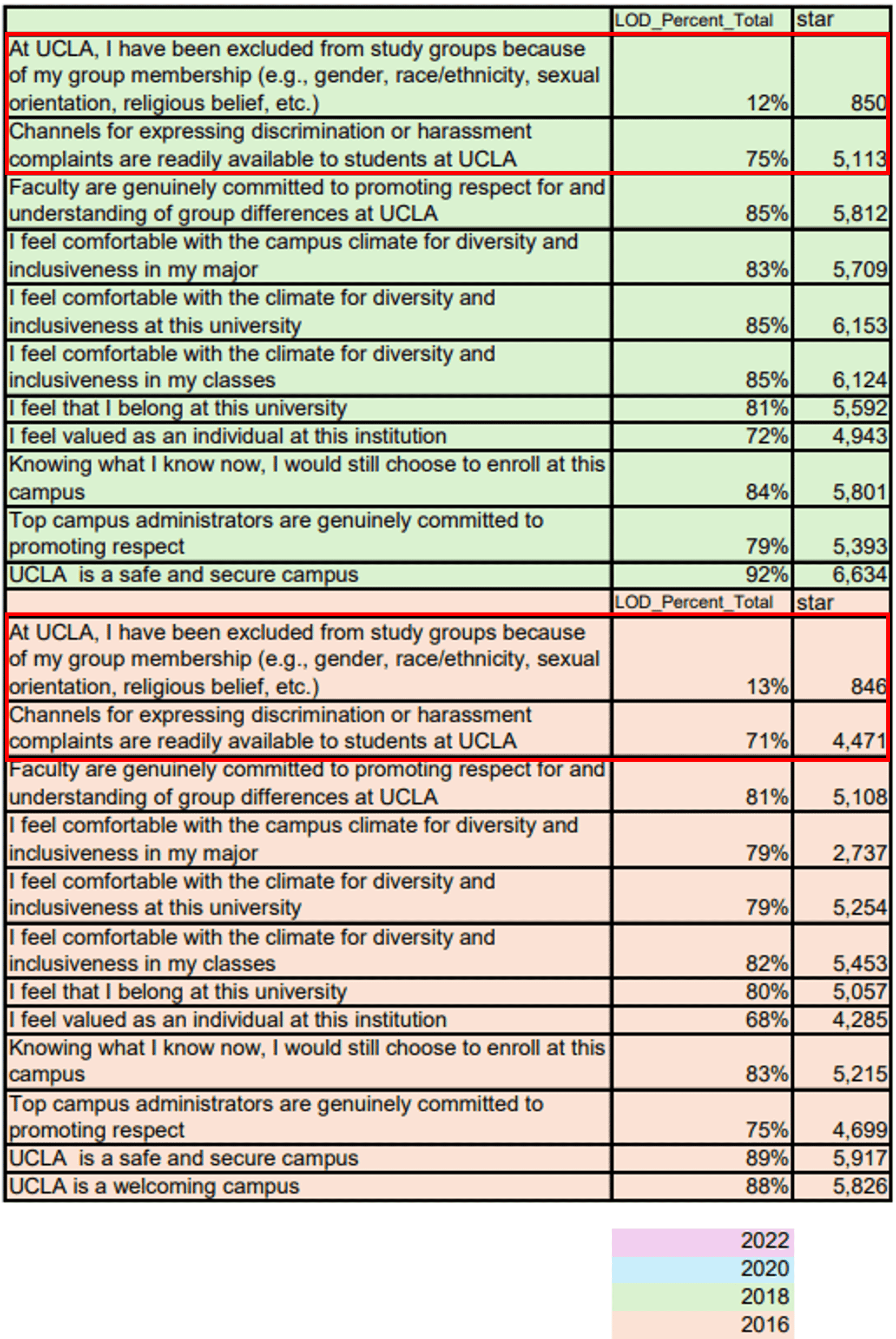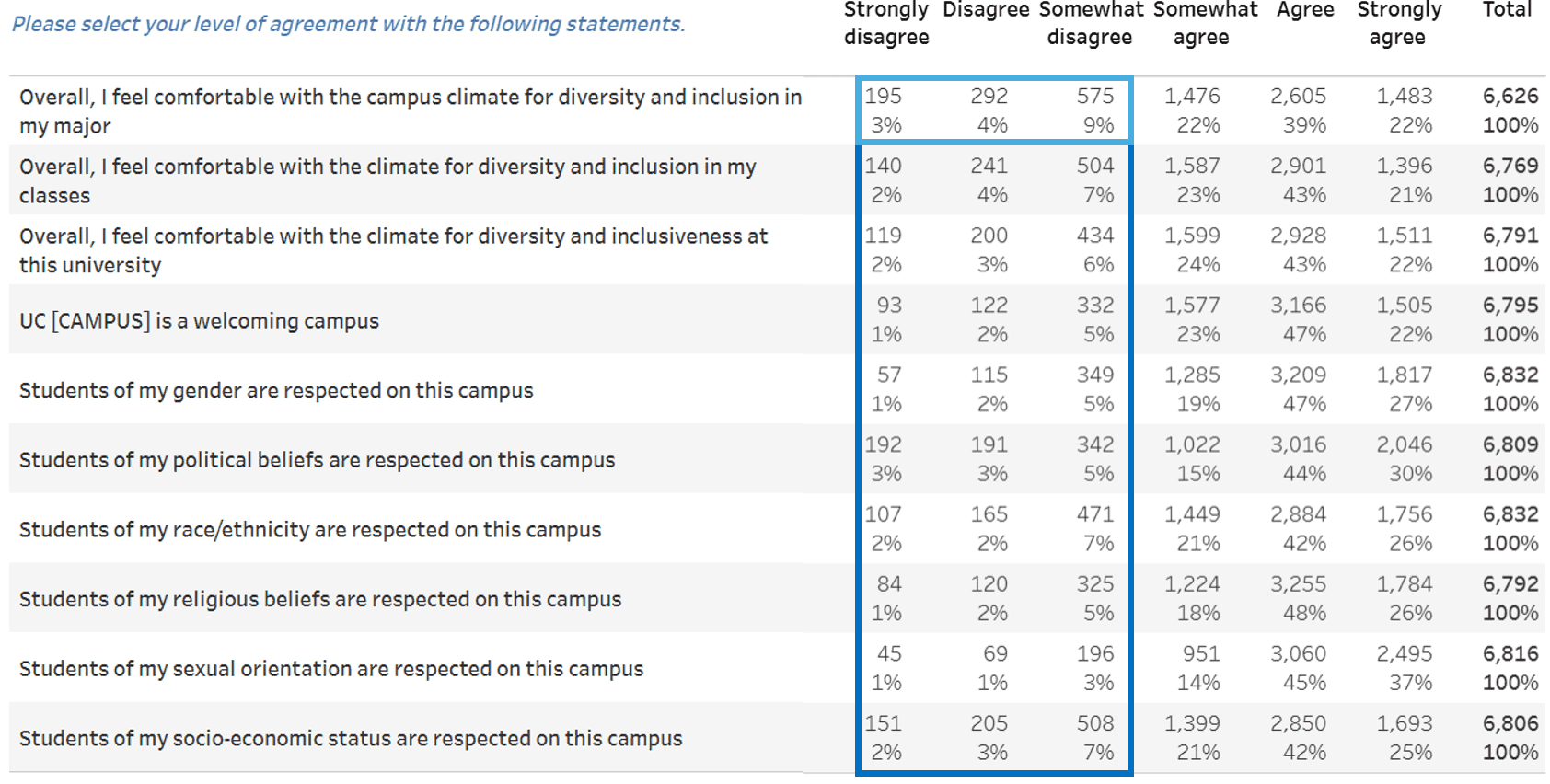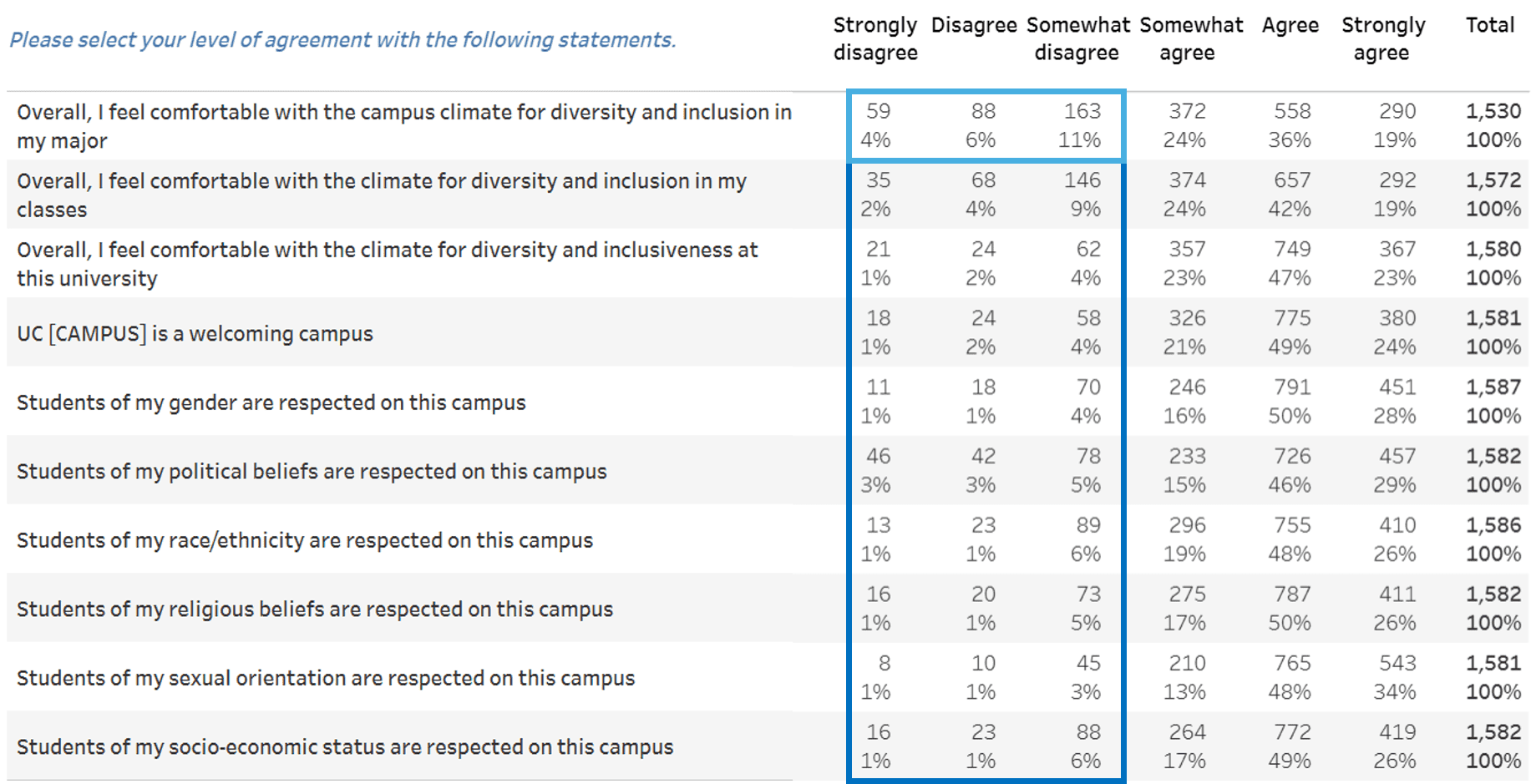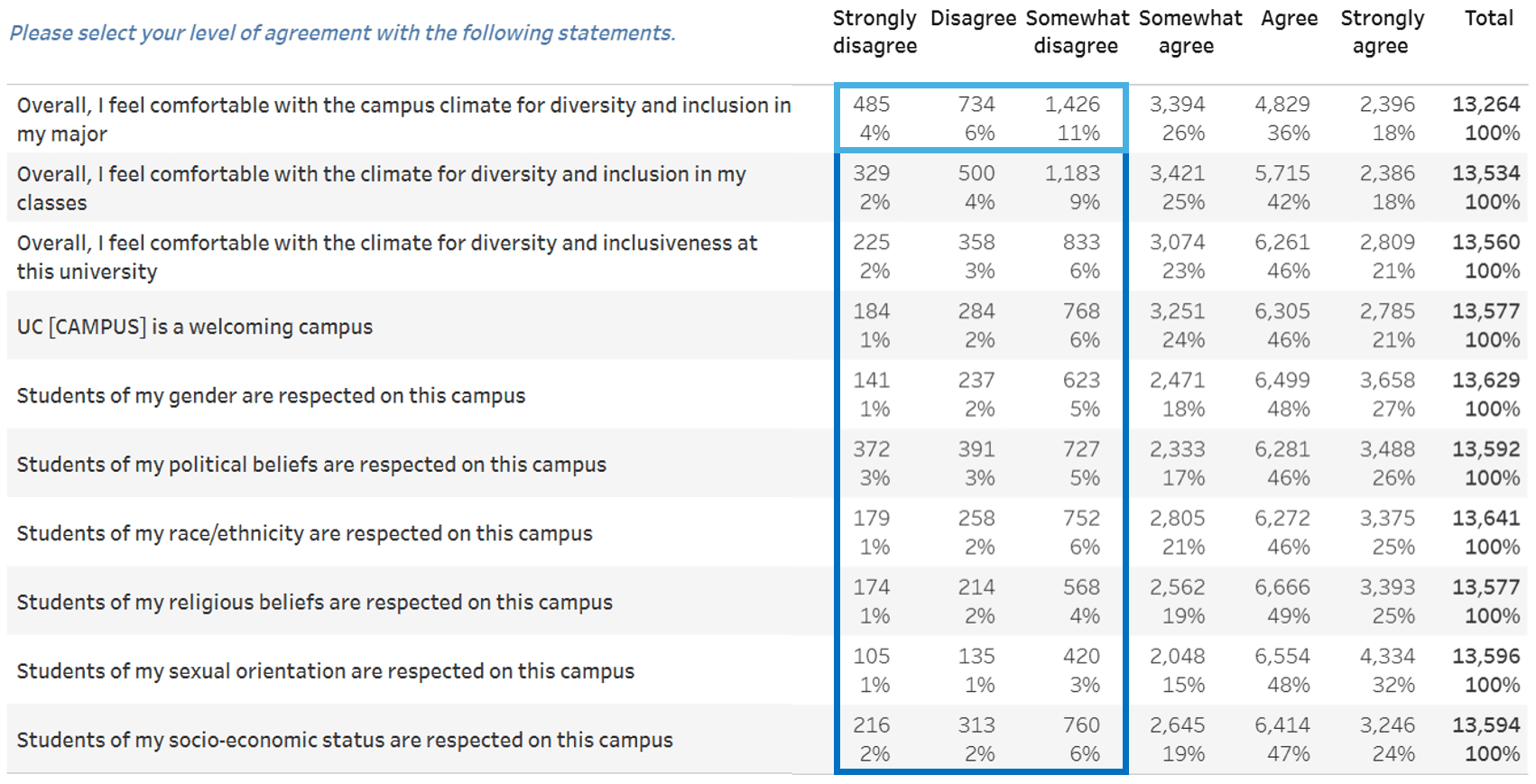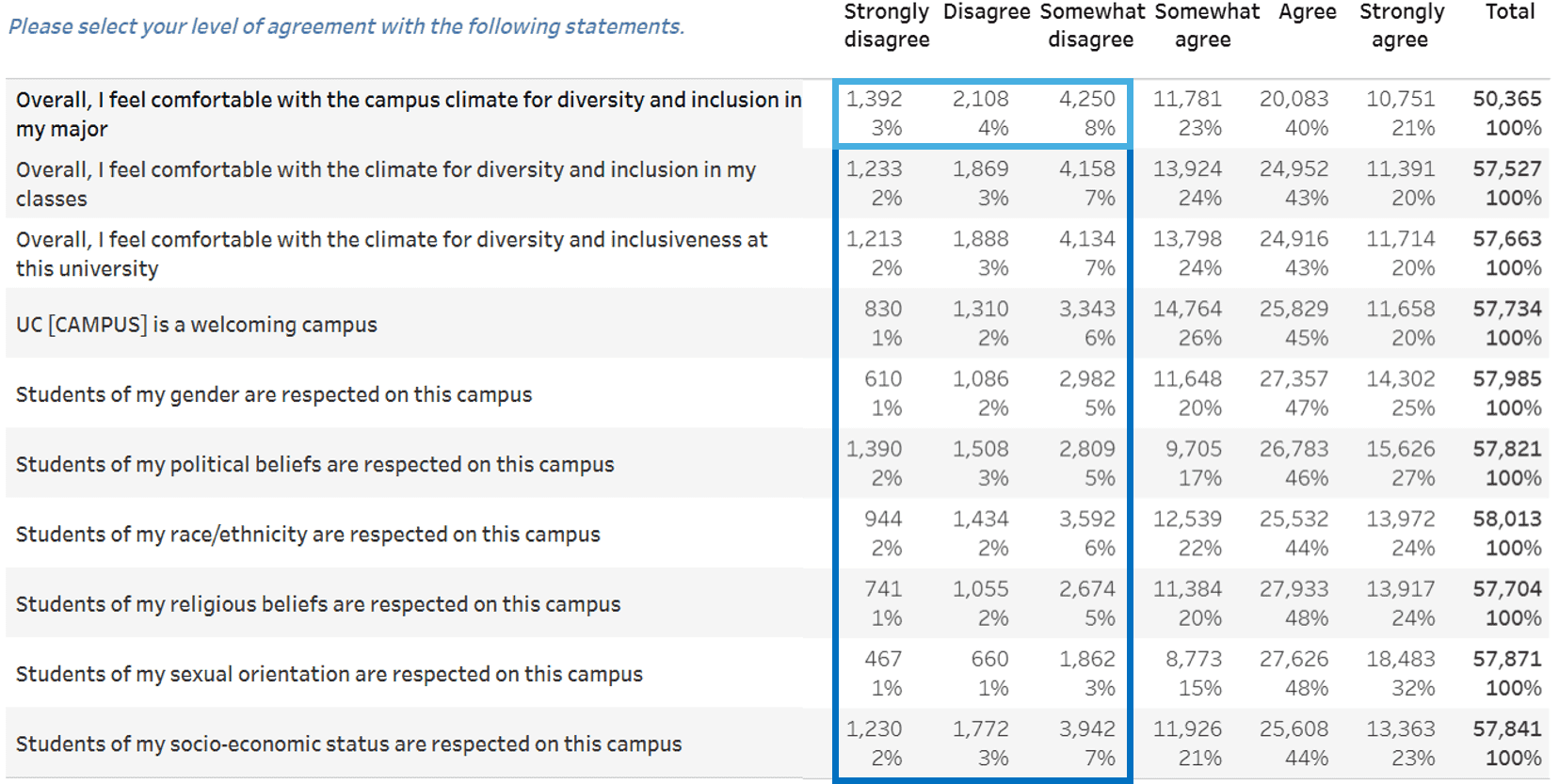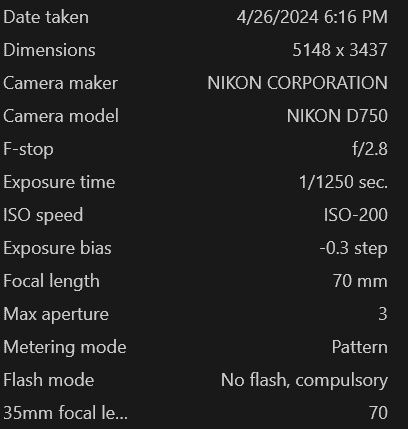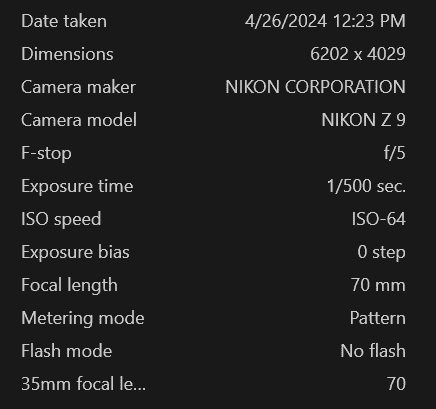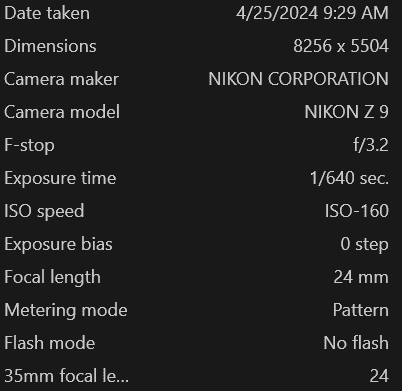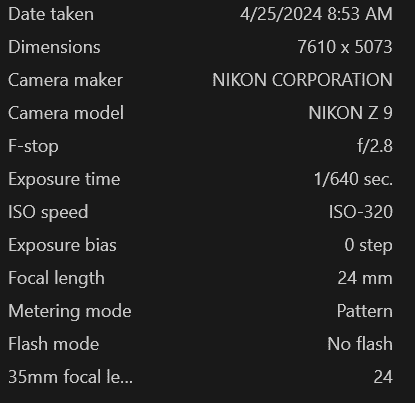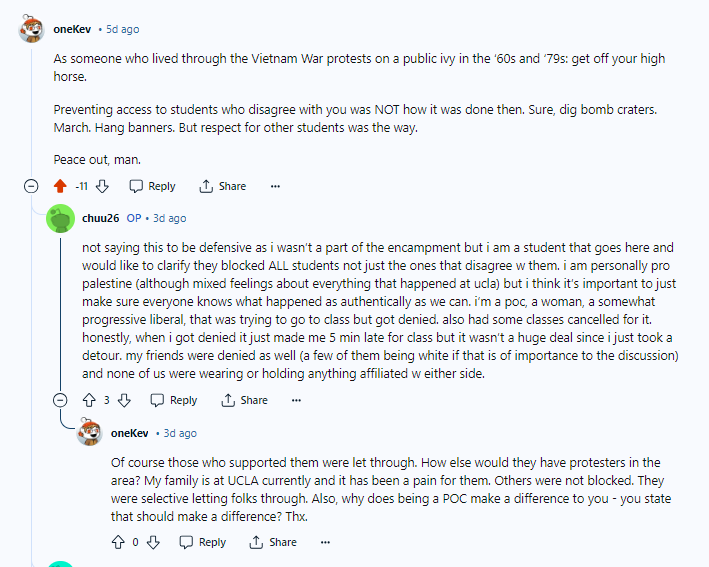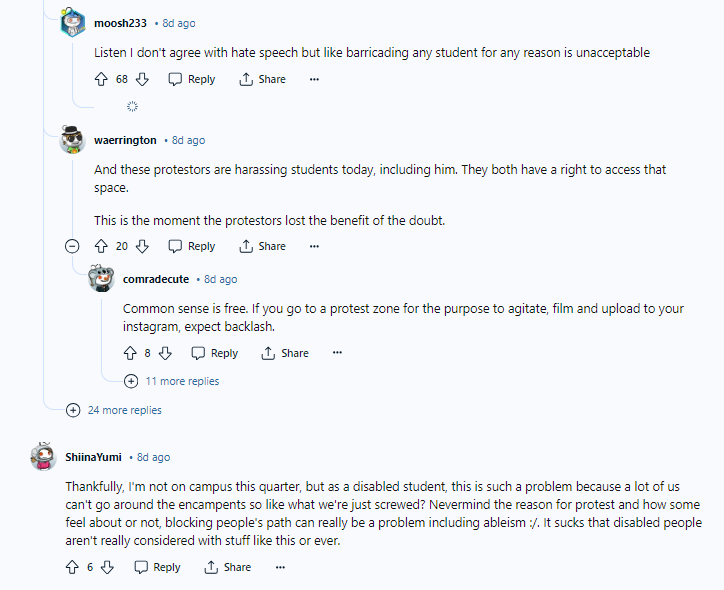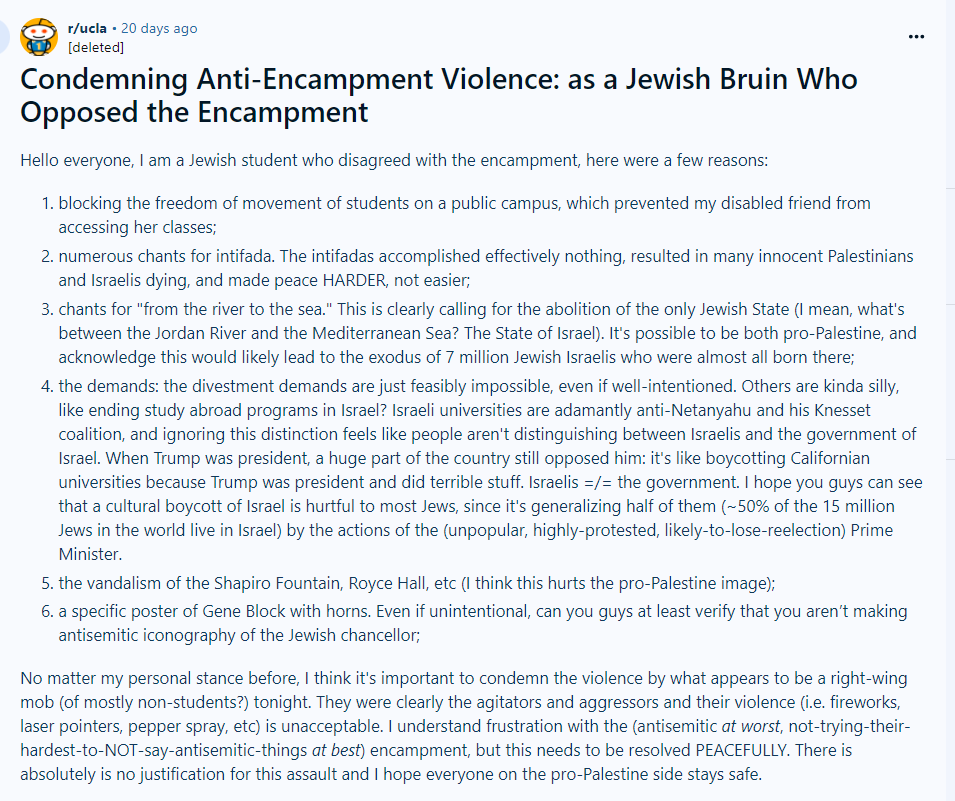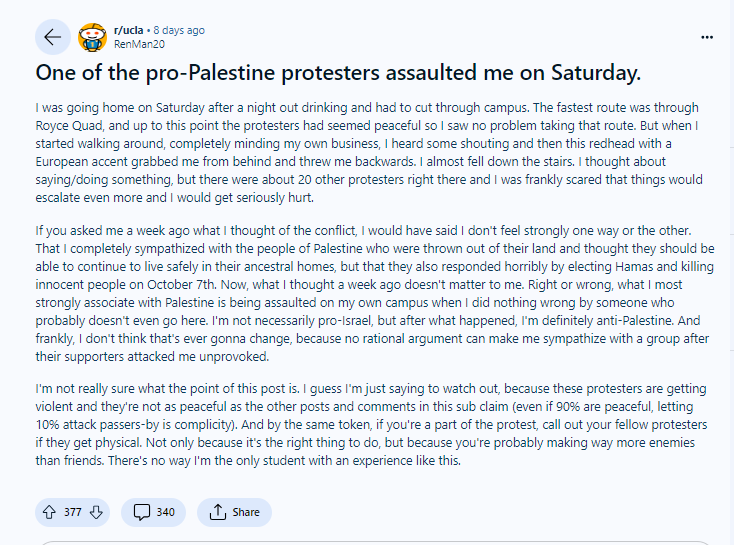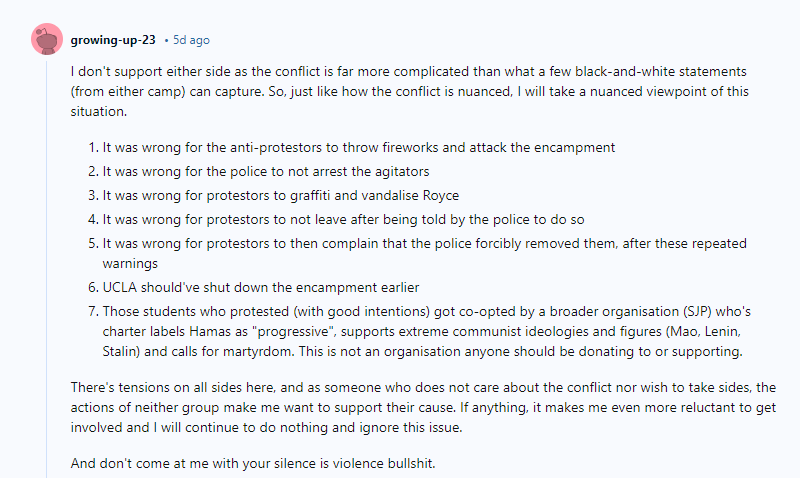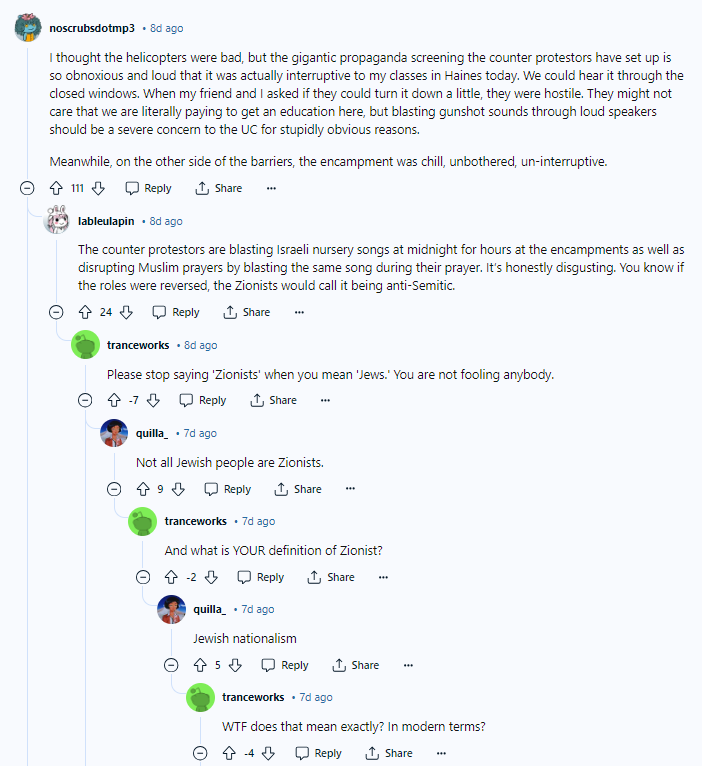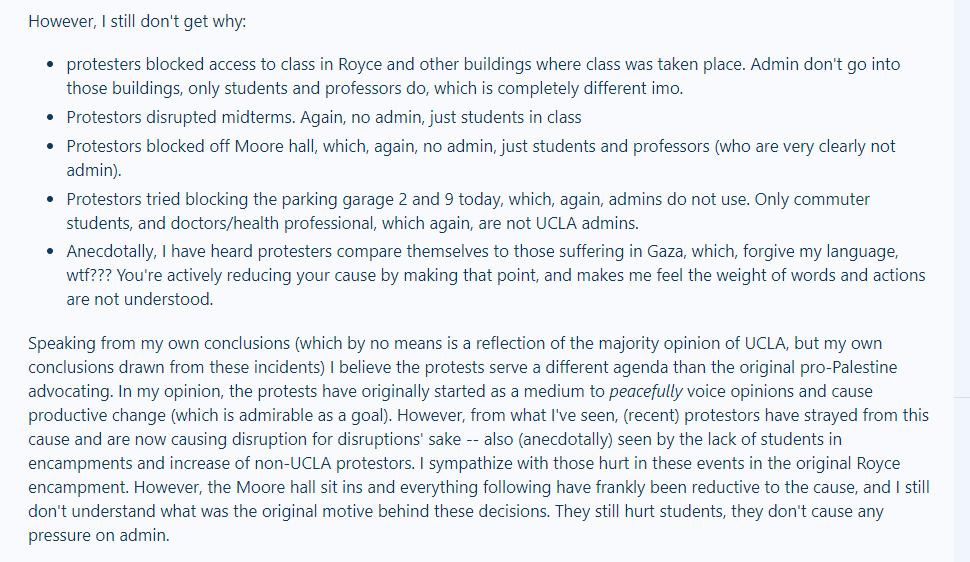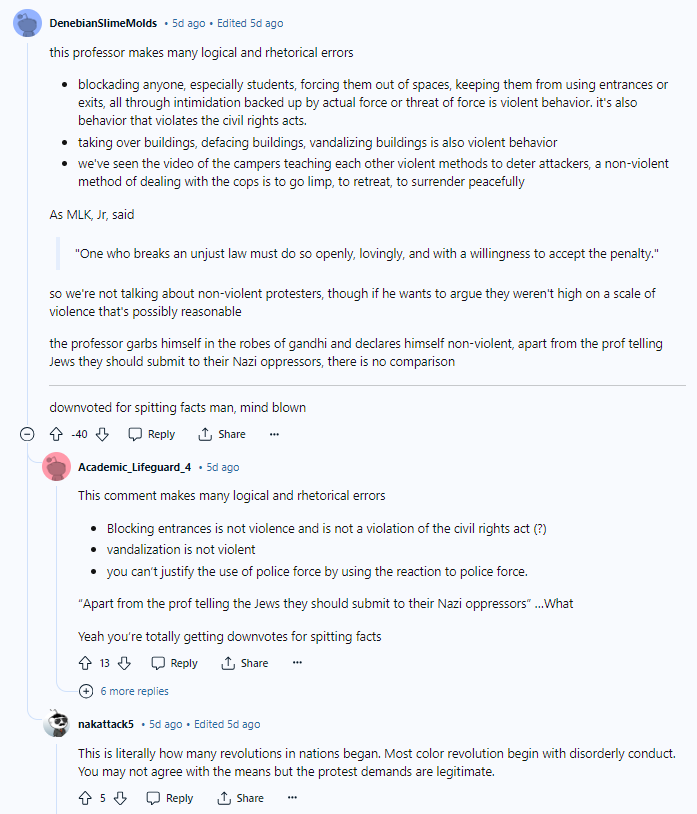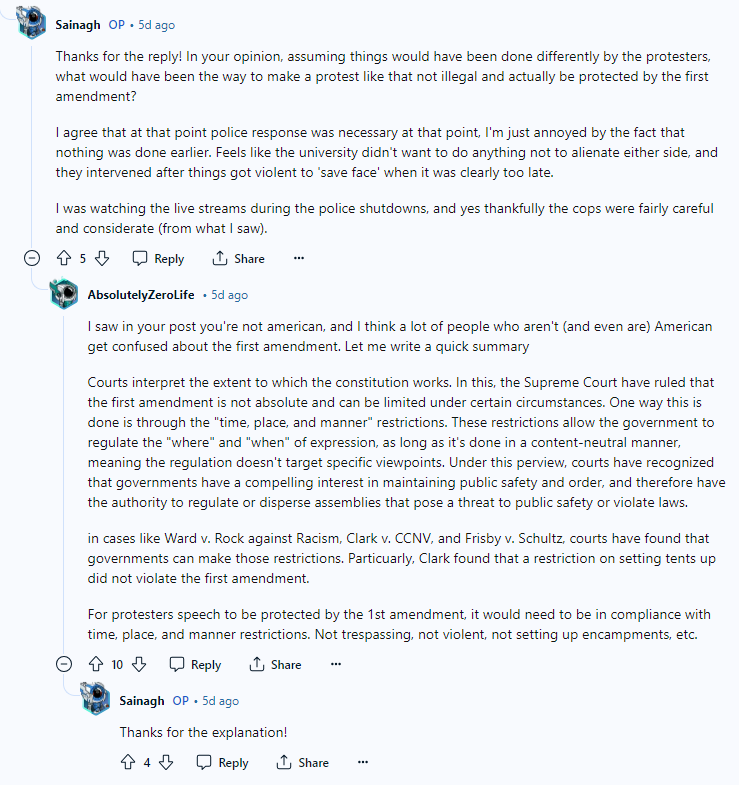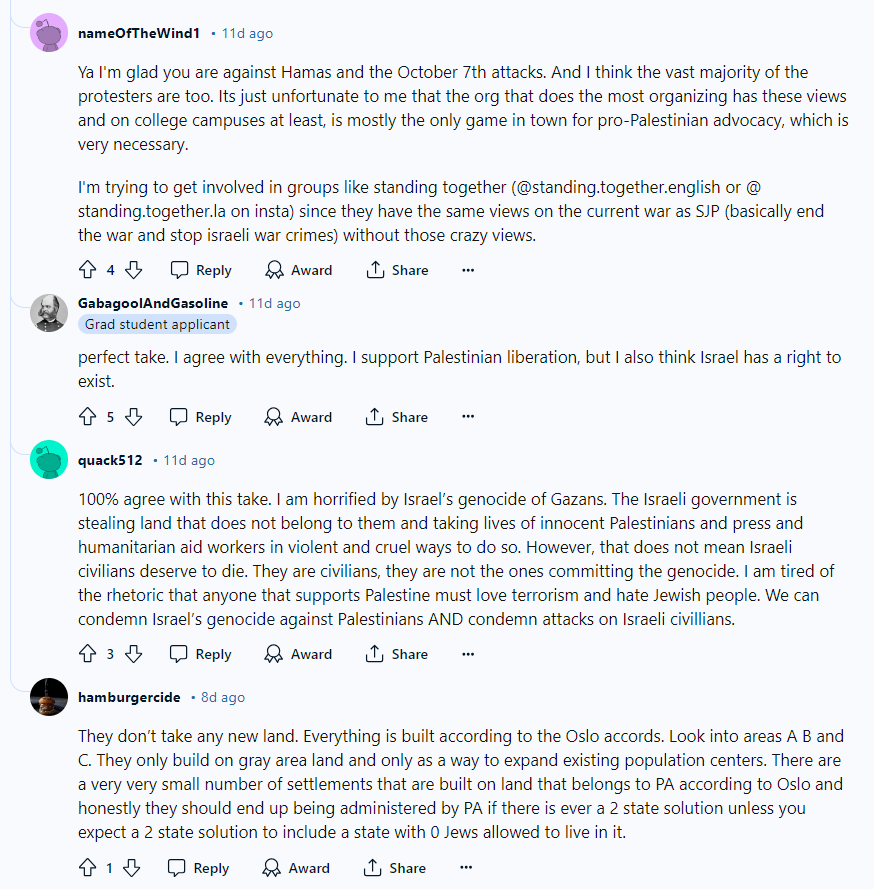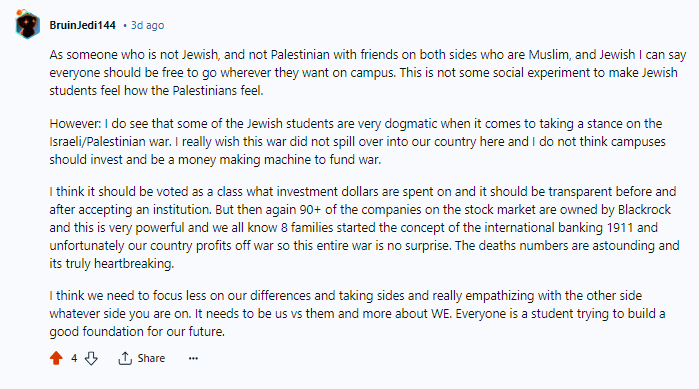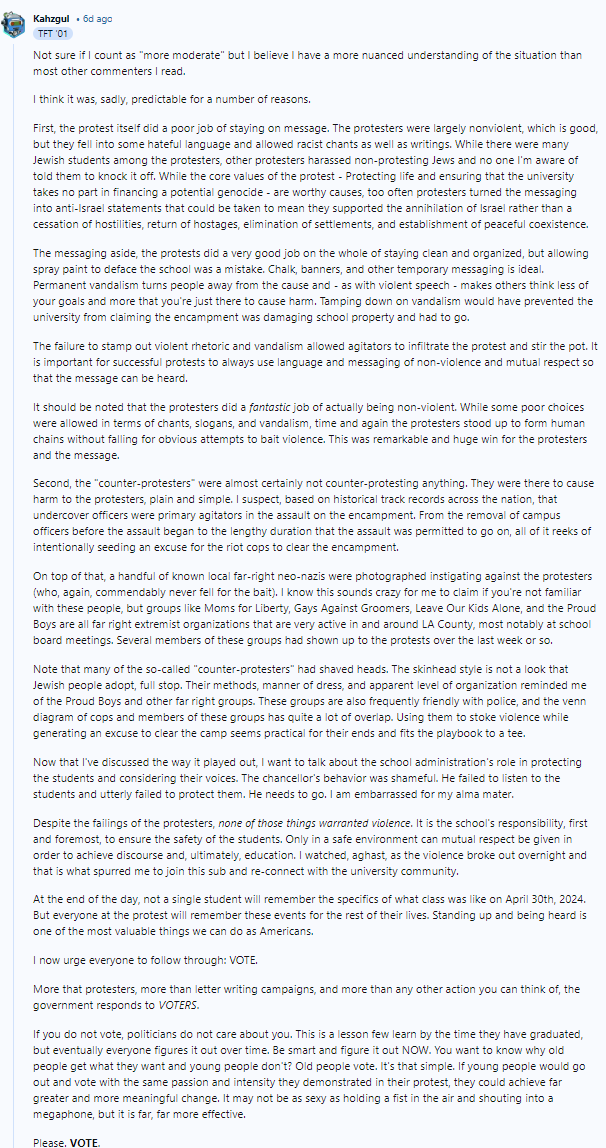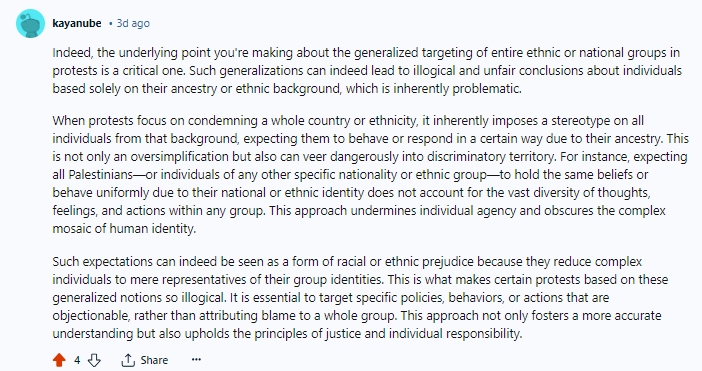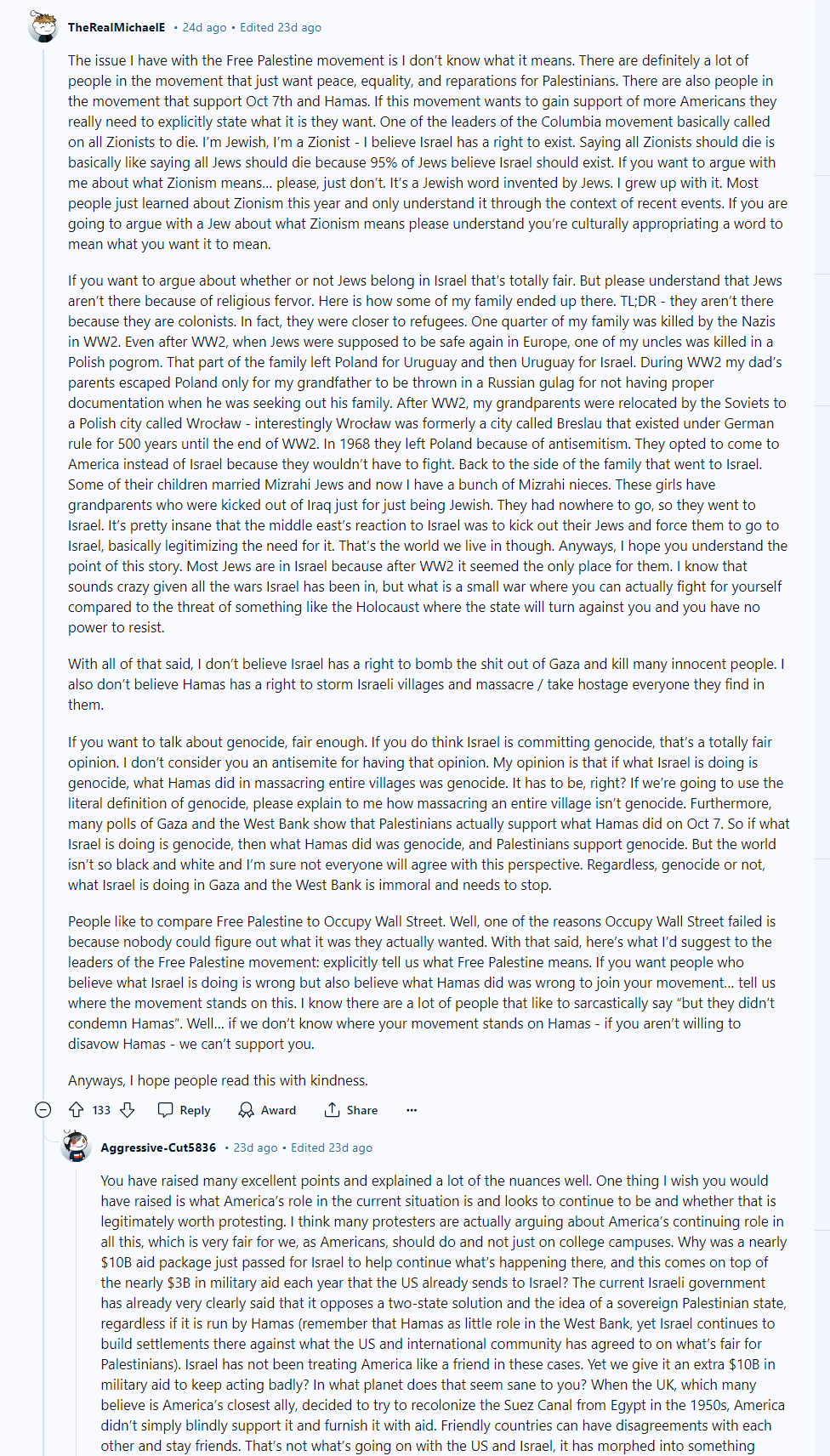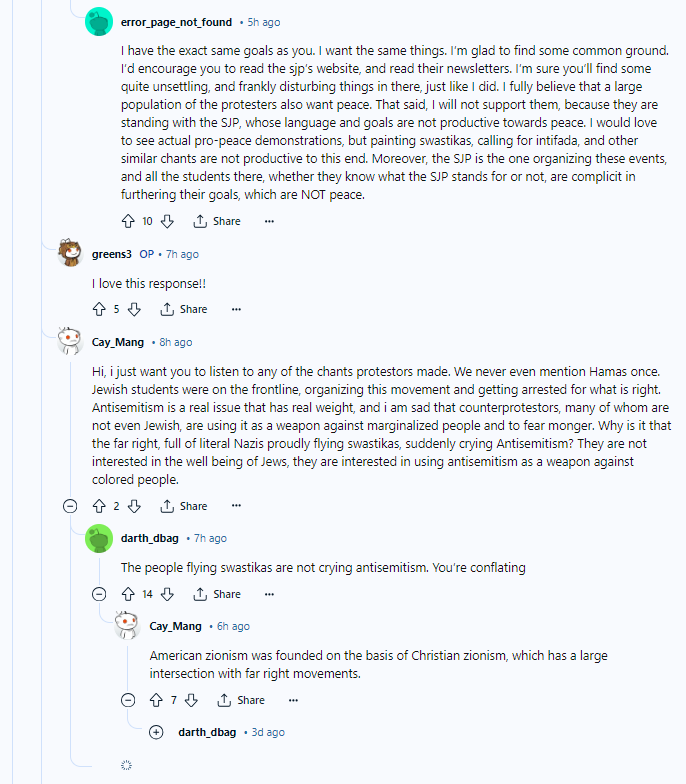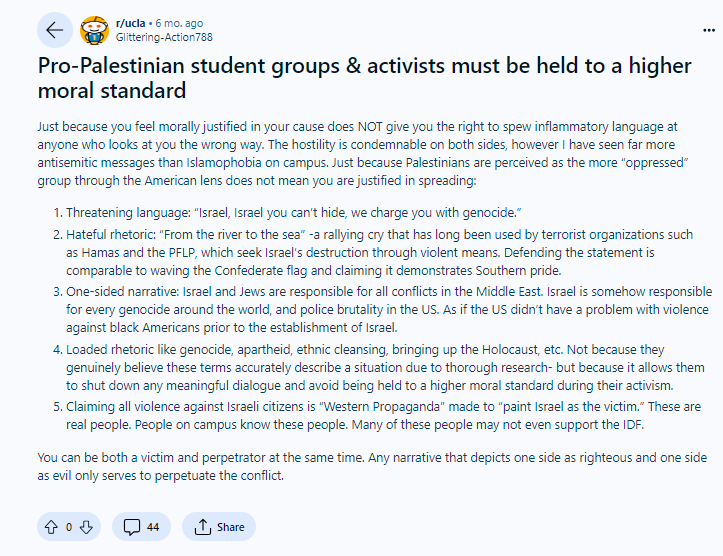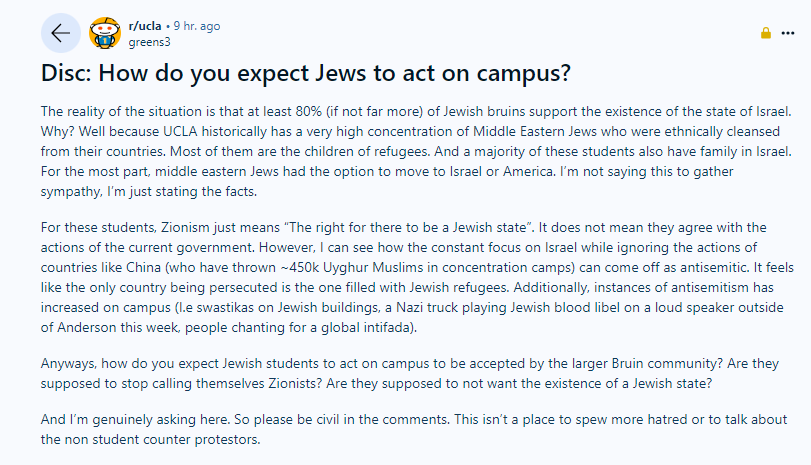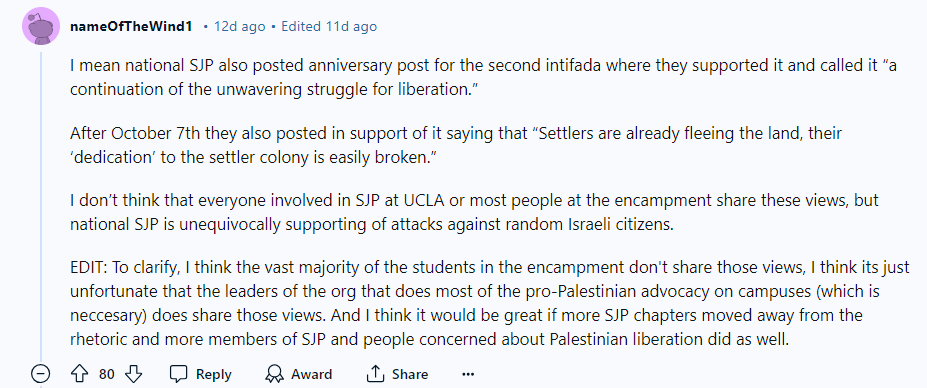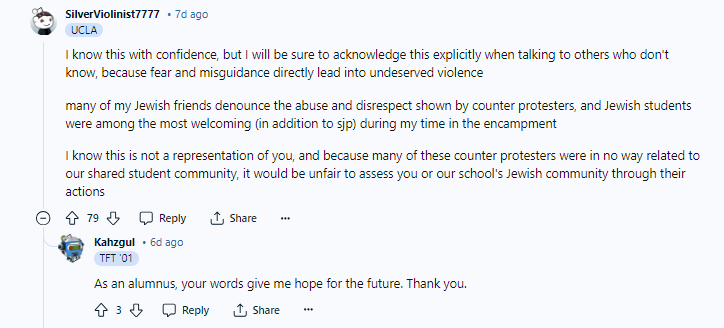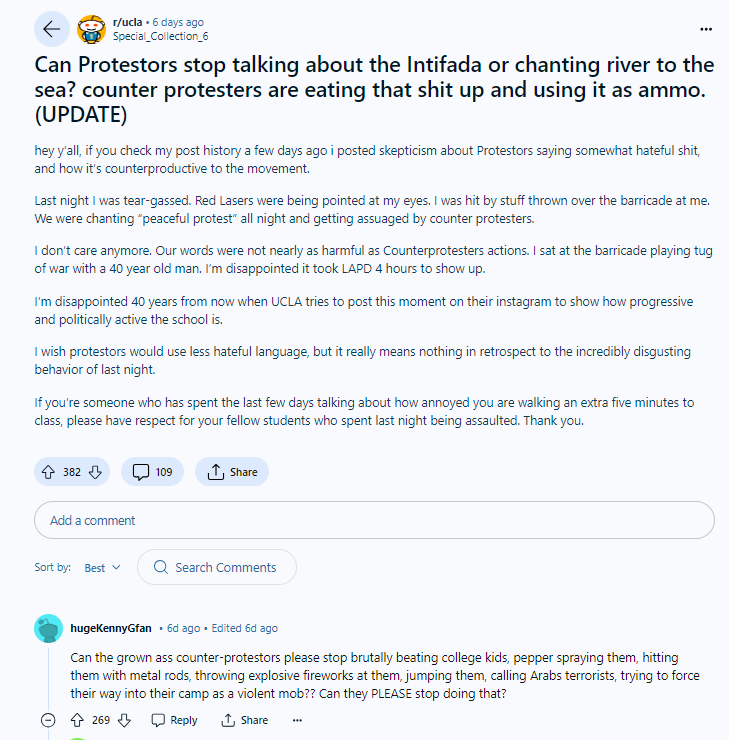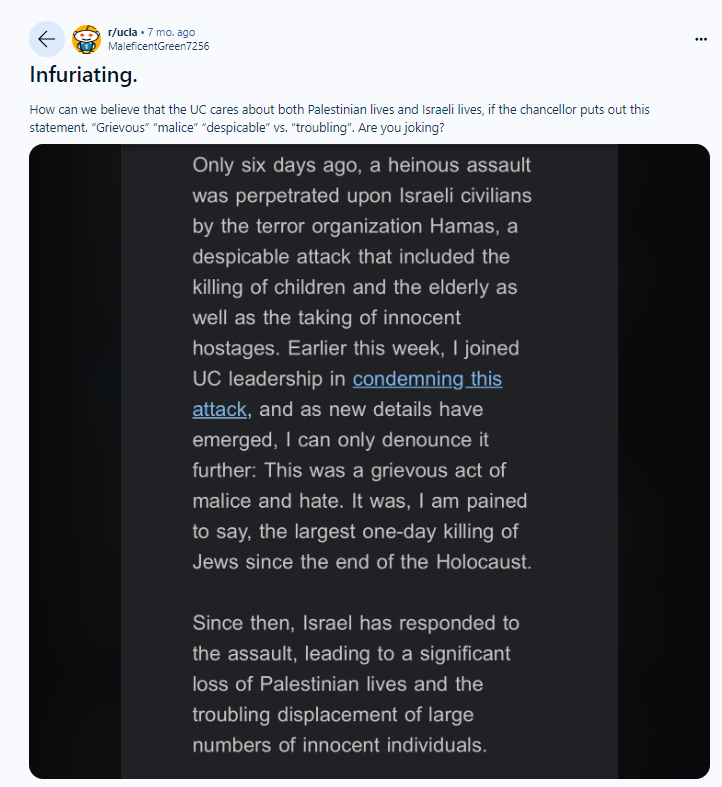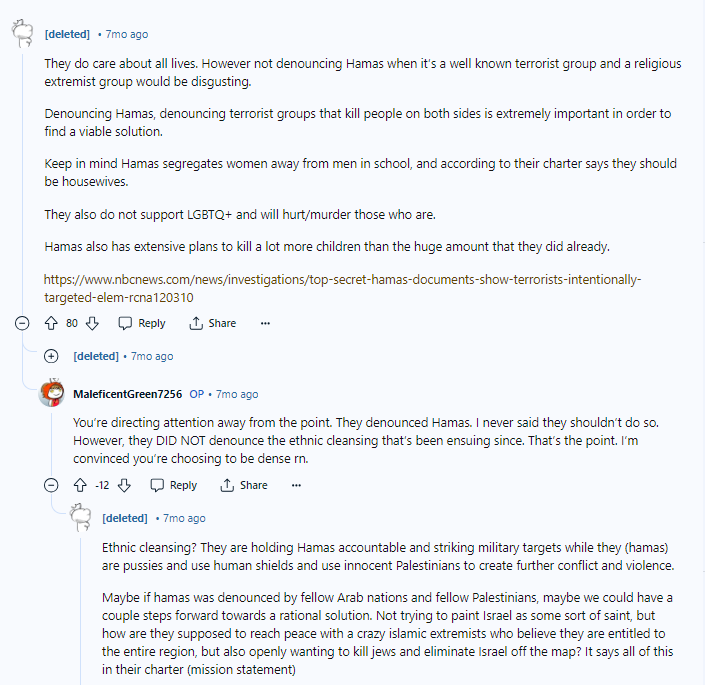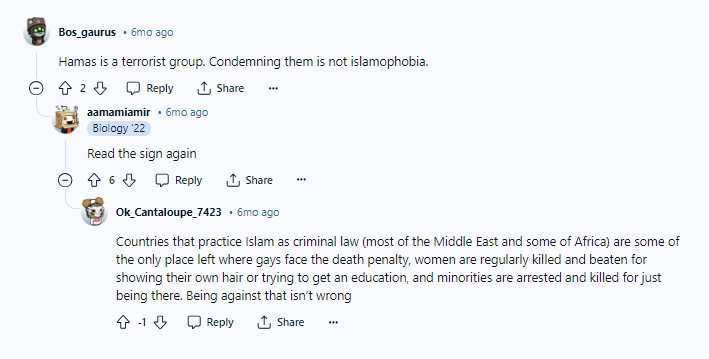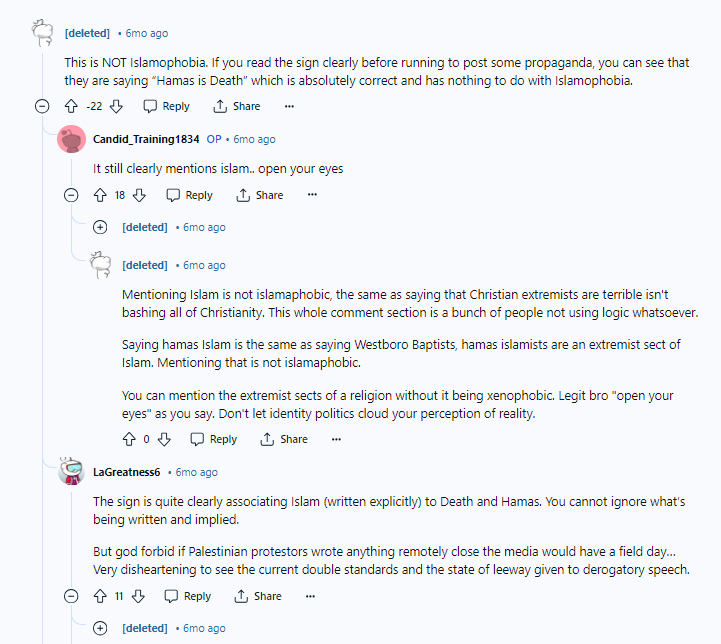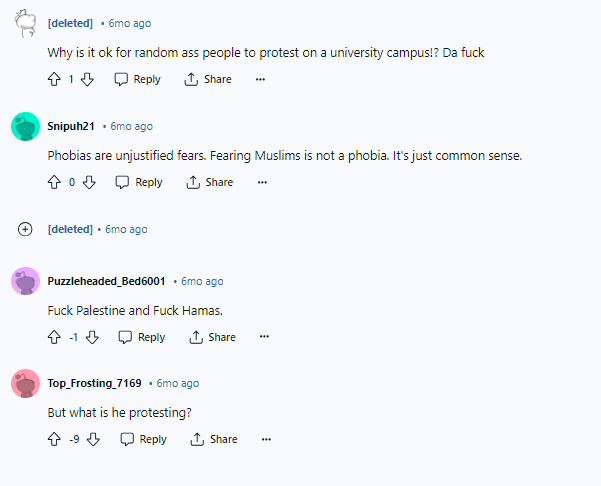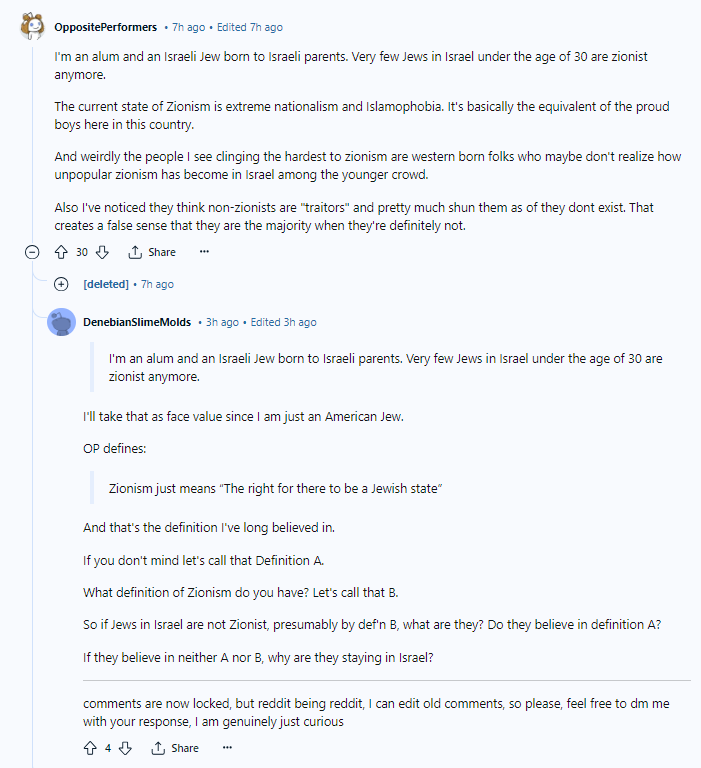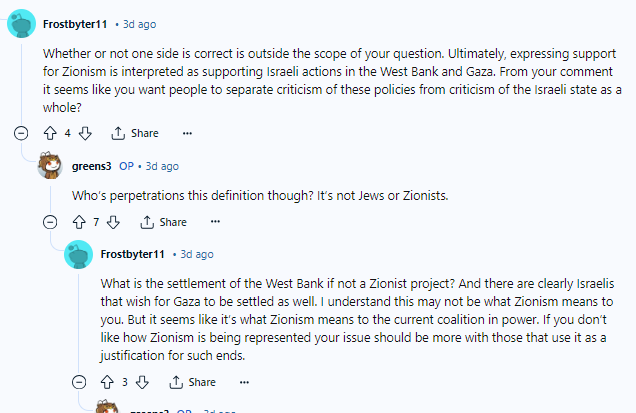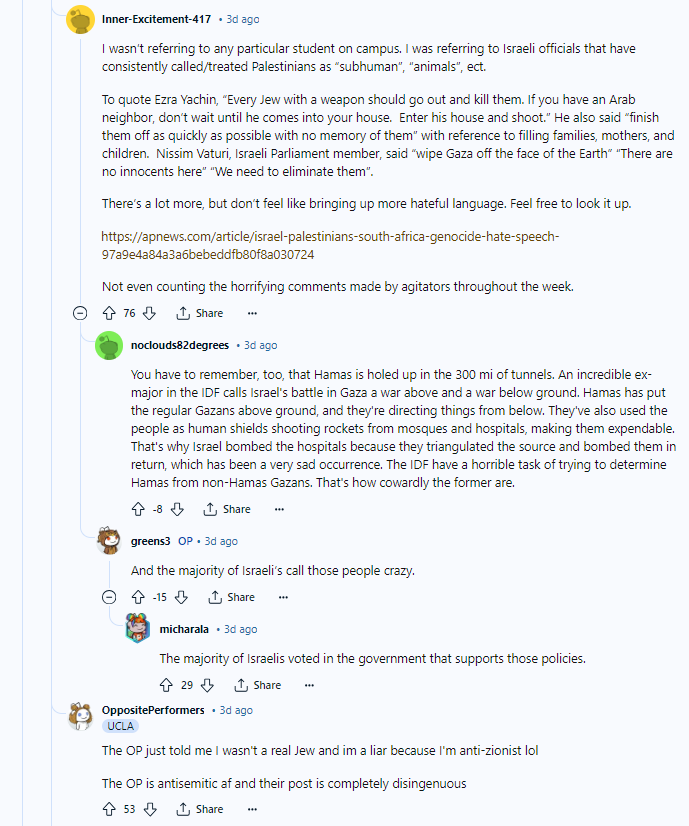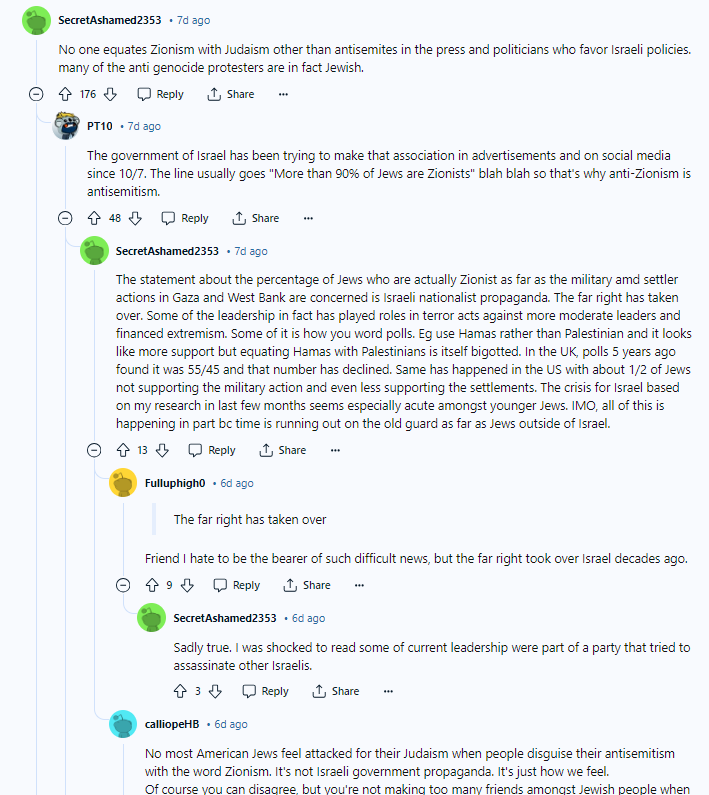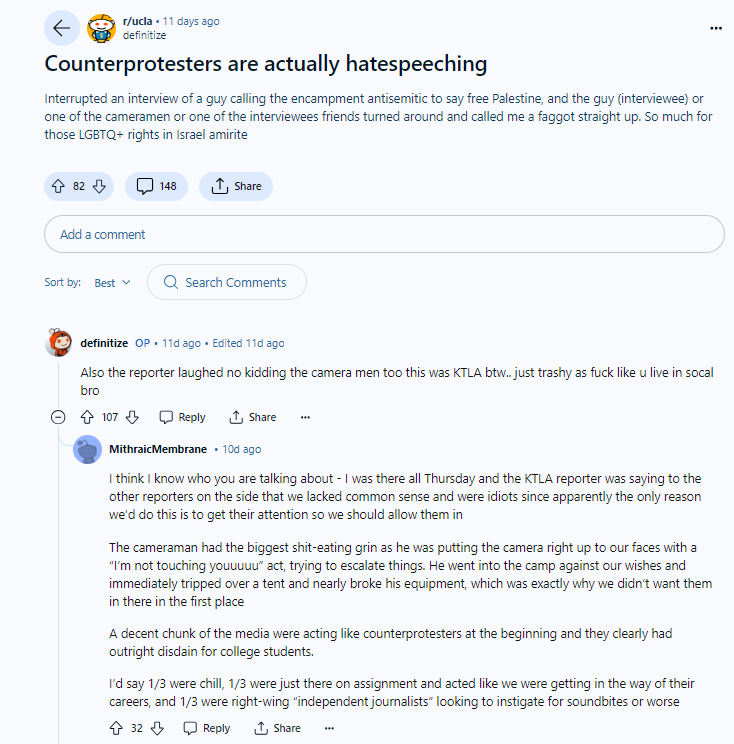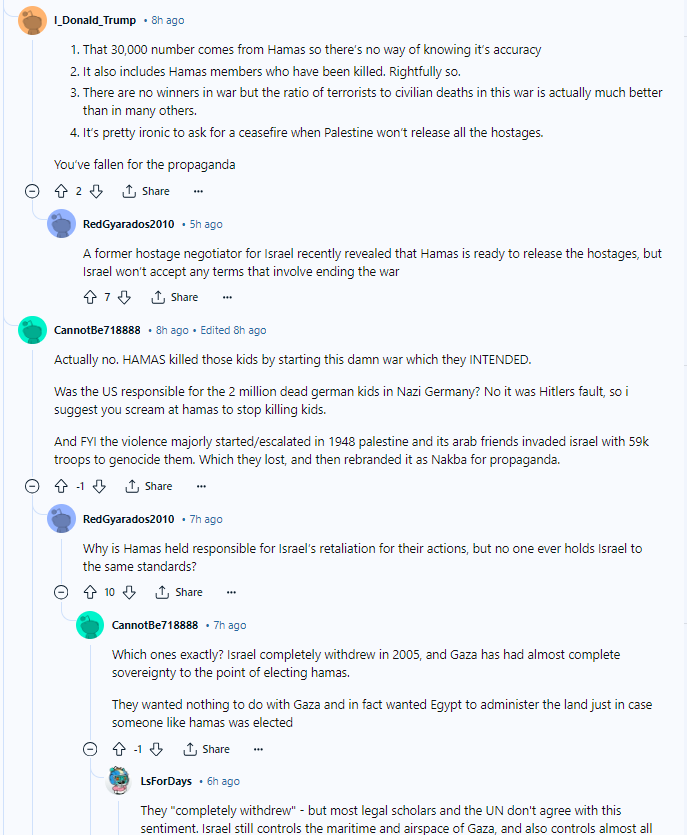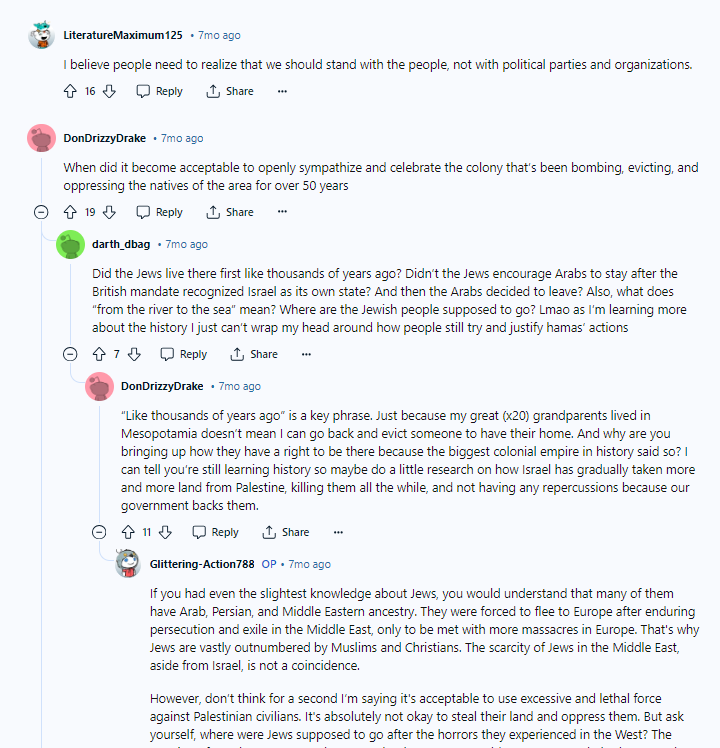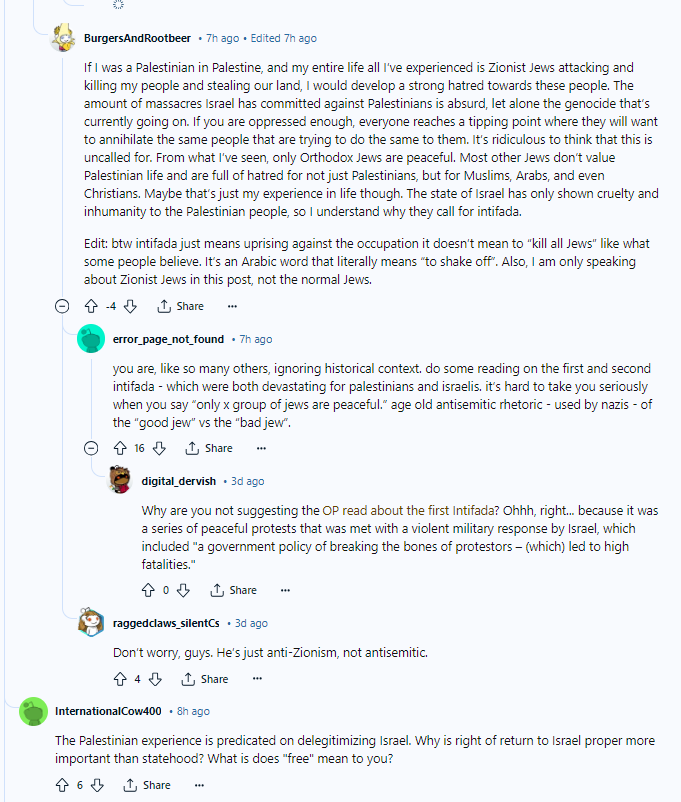Months Prior to Protest Events
David Myers wrote an op-ed entitled Antisemitic imagery at UC Regents meeting protest threatens campus discourse where he addressed the tense political climate at UCLA, “Since Oct. 7, our campus – like so many across the country – has been the site of intense and often tense discourse and action. The divide between those who support the cause of Palestinian liberation and those who support Israel’s right to exist has deepened more than at any point in my 32 years at UCLA, creating a seemingly unbridgeable gulf between the two sides.
It has also created, at various points in time, a sense of unsafety among many members of the university community, especially students. This too tracks larger national trends, according to a 2024 report that shows that 56% of Jewish university students polled after Oct. 7 felt in personal danger, and 52% of Muslim students felt in personal danger.”1
Myers depiction of this “unbridgeable gulf” has been corroborated by several Daily Bruin articles, where one titled Students voice worries over Islamophobia on UCLA campus, dated November 19th, details several concerning statements made by students.
“”I’ve been spit in the face. I’ve been directly pushed. I’ve been called a terrorist on multiple occasions,” said Mohammad, a student who was granted partial anonymity for safety reasons. “I’m constantly looking over my shoulder, I’m getting mean looks and people looking at me, just eyeing me down. I know they have the intention to make it some kind of form of harassment if they have a chance.””
“A Palestinian student, who was granted anonymity for safety reasons, said they have heard numerous accounts of people yelling hateful comments at those wearing keffiyehs. While they said they have only heard accounts of physical violence perpetrated by non-students, they added that they have seen students spreading hate speech on campus about Arab students – such as calling them terrorists and Nazis and saying they deserve to be raped and killed.”2
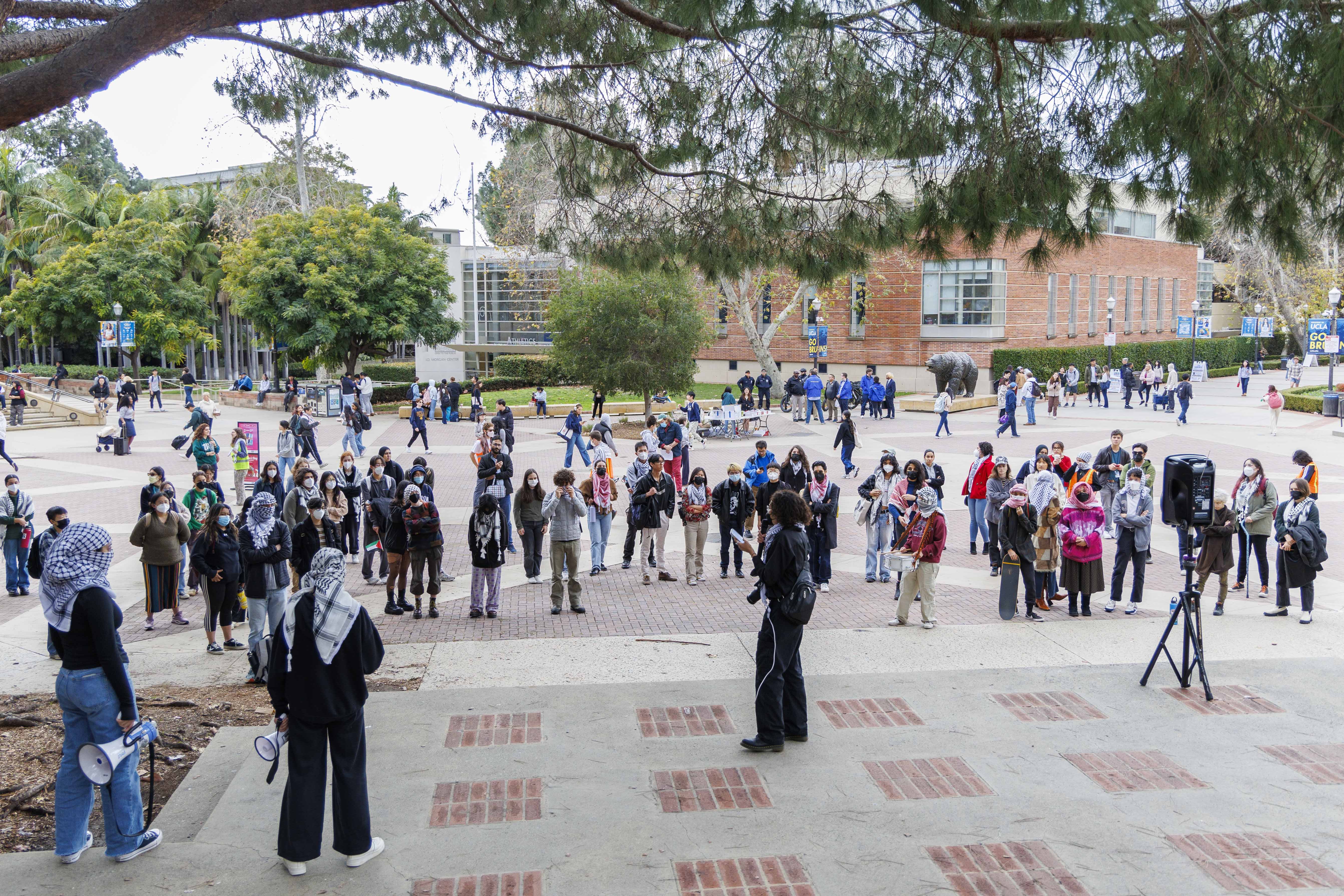
Another, Jewish students express concern over antisemitism on UCLA campus, highlights pervasive language among the pro-Palestinian movement that some students feel is threatening. “”The challenging environment is that the form of antisemitism that we’re often experiencing, especially since Oct. 7, is a form of antisemitism that has become normal,” Gold said. Gold said he believes rallies in support of Palestine have made Jewish students feel unsafe on campus. He added that he feels that chants such as “Resistance is justified when people are occupied” and “From the river to the sea, Palestine will be free” are statements intended to intimidate others.”3
A direct account was given on Feb 8th by a Bruin journalist at a BDS rally (bla), “The protest, which was hosted by Students for Justice in Palestine alonside the UC Divest Coalition at UCLA, also contained chants and speeches.”
“Do you realize how Zionists, … they have that ugly, half-American, half-Zionist smiles?” they said in a speech, leading to shouts of agreement from the crowd. The speaker also repeated insults at counter-protesters, even after being instructed not to engage with them by other organizers. “They’re just losers who are colonizers and settlers, and they will be defeated,” they said in a speech. “They are stupid, annoying and ugly.”4
Myers also addressed—and likely the reason he felt compelled to speak out in the first place—an antisemitic statue placed outside of the UC Regents meeting on March 20th. “The regents’ meeting attracted protesters who bore signs and uttered chants calling for divestment from companies that have ties to the Israeli military. Alongside these signs, someone placed…a statue that depicted a pig holding a bag of money in one hand and a birdcage with a keffiyeh in the other. To anyone familiar with classic antisemitic stereotypes, it is impossible not to recoil.”
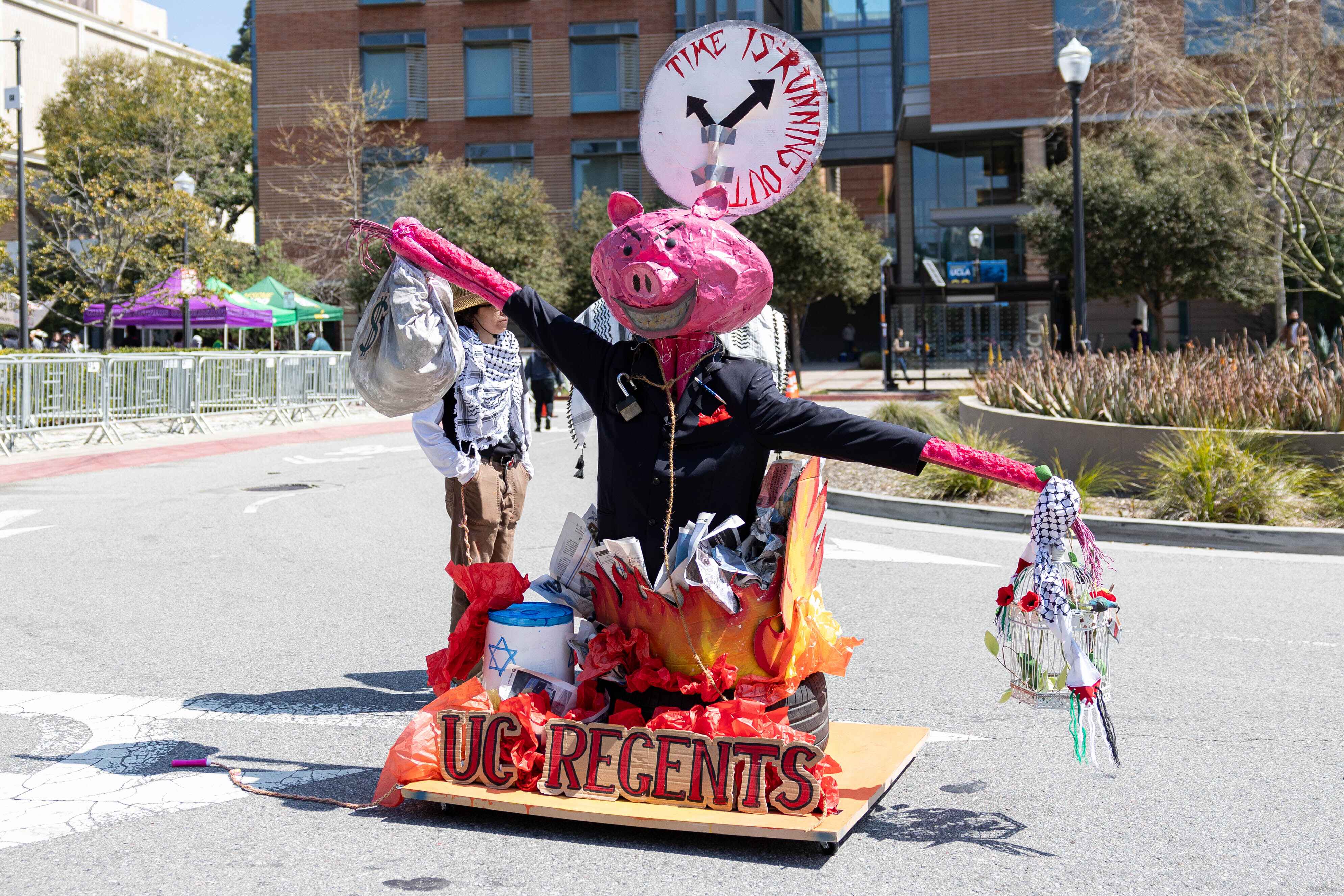
While the antisemitic imagery displayed in 21 might be obvious to some, this is not the case for others. 22 shows “MysteriousQueen81” attempting to gamify logic in order to argue the semantics underlying the imagery. To which anyone familiar with racist imagery in our art and culture might borrow “ToTheLastParade”’s response in saying, “The mental gymnastics in this post…”
Figure 23 and Figure 24 depict Hillel’s Executive Director, Dan Gold messaging over the pro-Palestinian movement’s immediate offensive stance after the events of Oct 7th. The posts, dated October 26th, refer to a flooding of “emails and phone calls from constituents and stakeholders from every corner of our community” over the chant against “Israel and Jews…“we charge you with genocide””.
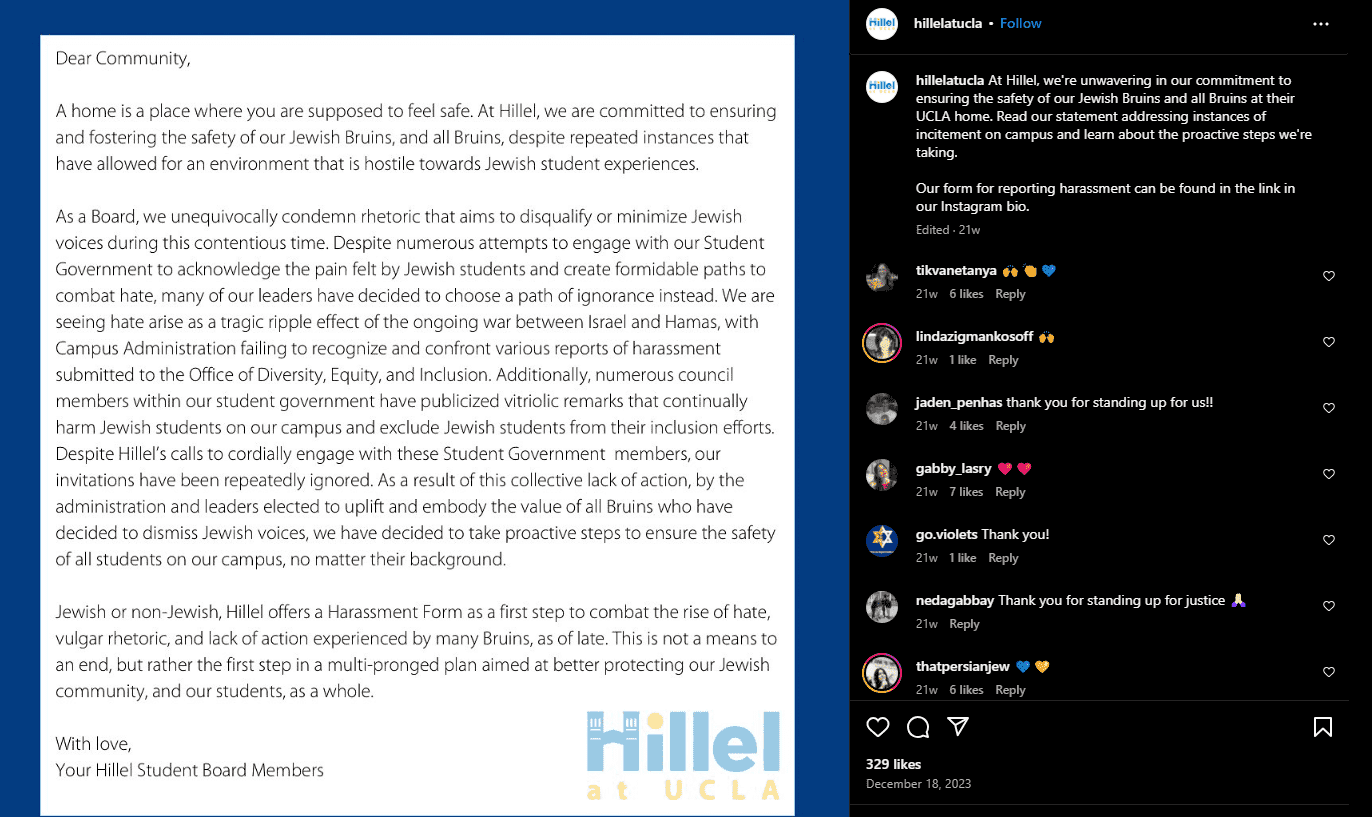
Figure 25 shows a post written by Hillel Student Board Members on December 18th, stating “Despite numerous attempts to engage with our Student Government to acknowledge the pain felt by Jewish students and create formidable paths to combat hate, many of our leaders have decided to choose a path of ignorance instead.” The post goes on to condemn Campus Administration and council members for their (willful) negligence, and proposes methods of taking incidents of harassment into their own hands.
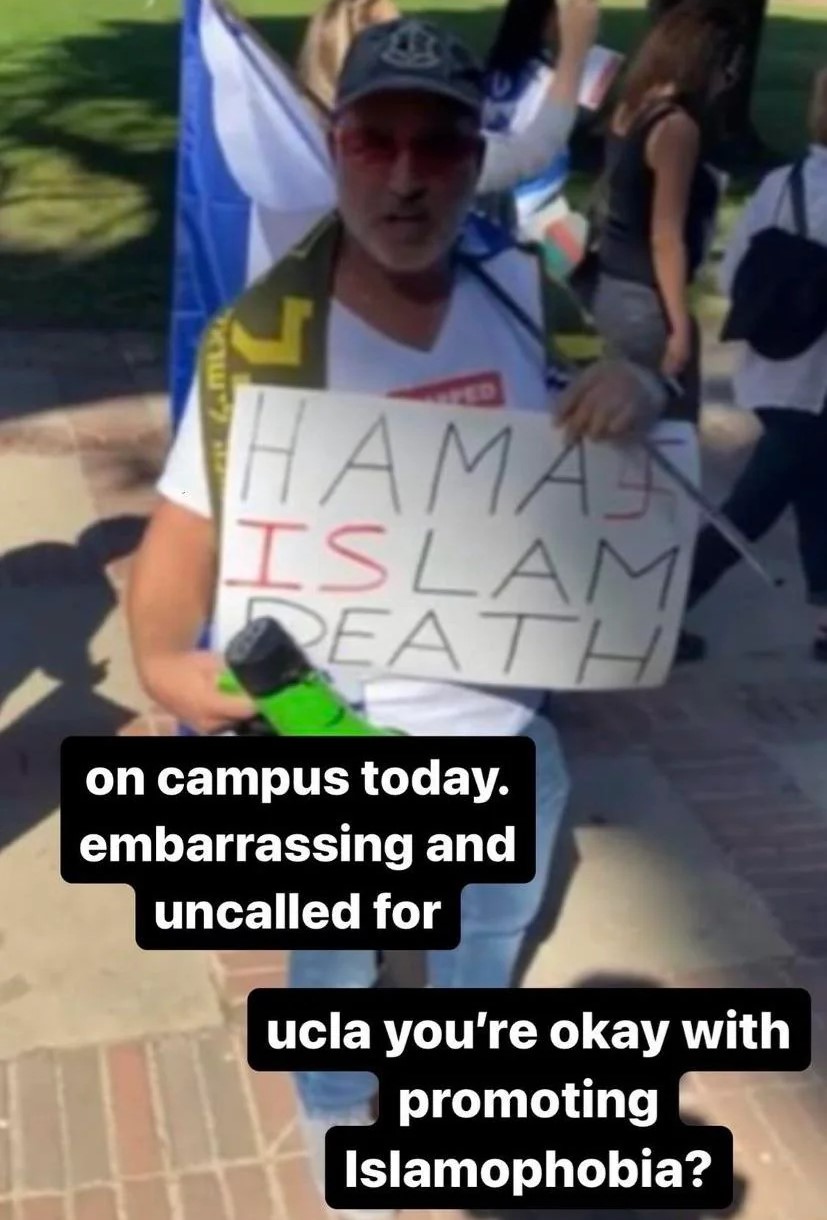
Figure 22 is a photo of a non-affiliate protesting at UCLA in approximately October. On Reddit, the same “mental gymnastics” debate arose, where many on the thread disregarded any “Islamaphobia” by this protester because the “Hamas” is also written on the sign. I think “Candid_Training1834” put it best when they said “While it’s important to address the actions of any organization, it’s also crucial not to generalize or stereotype an entire religion based on the actions of a few. It’s not Islamophobic to criticize specific actions, but it becomes problematic when it’s used to paint a negative picture of all Muslims.”5
The Instagram post below (28) is referring to a professor led teach-in (Figure 12) occurring on Oct 11th that was met with harassment from UCLA students. A video of the encounter can be found on the 5th page of the post. Regardless of how “understandable” being upset may be given the very recent events, the harassment infringes upon Title VI protections. These students were convening to “gain clarity, information, and perspectives on recent escalations in Palestine”. No one has the right to physically block peaceful students from accessing a classroom or yell at them using classic Islamophobic derogatory language.
University Support and Messaging
University Messaging
The tone for UCLA’s handling of campus culture is largely set by Gene Block, who has held the position of university chancellor for the last 17 years. Viewing his opening statement during the House Comittee on Education and the Workforce hearing (May 23rd), he sounds resigned to “put up with” any and all speech protected by the constitution, drawing parallels to his own experiences with extremists and antisemitism. See house-hearing @ 42 minutes for details.
On Novemeber 10th, Block (who is set to retire on July 31, 2024) released a statement addressing incidents of discrimation on campus. “Today, I joined University of California President Michael V. Drake and the UC chancellors in issuing a forceful condemnation of incidents of bigotry, intolerance and intimidation that have taken place on UC campuses — including UCLA — over the past several weeks. We must be crystal clear: discrimination, threats, violence and hate have absolutely no place in a university community dedicated to open-mindedness, respect and mutual understanding. Our full message appears below.”6
“More than denounce bigotry, though, we must also actively work against it. President Drake will be sharing a series of systemwide initiatives in the coming weeks to address the current university climate, and my administration will be launching its own set of efforts to strengthen community and reaffirm our values in this period of intense strife.”6
Yet despite the Chancellor’s words, an antisemitic characature still appeared on campus on the March 20th date of the UC Regents meeting (see Figure). The response to the statue (on March 28th) was to say it had been removed and to condemn it it as “antisemitic” and “hateful”; calling it an “affront” to UCLA’s “Principles of Community” and “True Bruin Values”7. The message also took care to say,
“It is absolutely critical that Jewish members of our community — as well as those of all backgrounds and faiths — are treated with respect and dignity.” 7
University administrators and Gene Block continued with the same tone during and after the protest. On April 26th Mary Osako, Vice Chacellor for Strategic Communications wrote, “It’s also important to note that we are following University of California systemwide policy guidance, which directs us not to request law enforcement involvement preemptively, and only if absolutely necessary to protect the physical safety of our campus community.”8
When escalating aggression between protesting sides became more and more apparent, the Daily Bruin Reported on April 28th, “Osako said in the statement. “As an institution of higher education, we stand firmly for the idea that even when we disagree, we must still engage respectfully and recognize one another’s humanity. We are dismayed that certain individuals instead chose to jeopardize the physical safety of the community.””8
On April 30th a crytpic flyer was released to the encampment saying, “The established ecampment is unlawful and violates university policy. For non-UCLA affiliates: Please be aware that your presence on campus as a non-affiliate engaged in an encampment violates the law and constitutes criminal behavior subject to misdemeanor charges.9
California Education Code section 92440.5, and the regulations it authorizes, limit the conduct of people who are not students or employees of the University of California on university property. Violations of these regulations are punishable as a misdemeanor.9
Anyone not affiliated with the university who chooses to come to campus should keep these regulations in mind. For example, any sign or flag must be smaller than 30 x 30 inches and on poles shorter than 18 inches (section 100014). No masking (section 100013-L) or camping (section 100005) is allowed.”9
On the same day, following the distributed flyer, at 5:04 pm Chancellor Block mentioned student conduct investigations into those who had blocked access to parts of campus and declared the encampment to be unauthorized in a campuswide email, ““UCLA supports peaceful protest, but not activism that harms our ability to carry out our academic mission and makes people in our community feel bullied, threatened and afraid,” Block said in the statement. “These incidents have put many on our campus, especially our Jewish students, in a state of anxiety and fear.””10
The events to follow received a great deal of press. For a full Bruin Daily account of the violence that unfolded on the evening of April 30th please see11. In short, when counter-protesters attempted to breach the encampment barrier to assault protesters, UCPD and private security CSC failed to act right away, and it was not until hours later that LAPD and CHP showed up to the scene to quell the violence. Statements released during and after the protests can be found here.1213
University Support
In the days after the encampment was cleared, Block gave students the standard resources for reporting, “Block also encouraged people to report incidents of violence to UCPD and discrimination to the Civil Rights Office, as well as using campus counseling resources. LAPD officers remained in Dickson Plaza as of 2:30 p.m. on Wednesday.”14
While the degree of force was excessive, it seems students remained confused about why “protesting peacefully” meant forcible removal, “Students denounced UCLA’s decision to have police sweep the Palestine solidarity encampment early Thursday morning (5/2), saying the degree of force was excessive on what they saw as peaceful protest.”15
Block has since been addressing the violence with administrative changes, “Chancellor Gene Block announced Sunday that the university has created a new Office of Campus Safety, which will manage UCPD and the Office of Emergency Management.”16
“The change moves the oversight of UCPD and campus safety operations away from the office of Administrative Vice Chancellor Michael Beck to the new office.”16
“The Office of Campus Safety will be led by inaugural Associate Vice Chancellor Rick Braziel1718, who has worked in public safety for more than 30 years, according to the email announcement. He served as the chief of police for the Sacramento Police department from 2008 to 2012 and has been an instructor at California State University, Humboldt since 2000.”16
In general, there are targeted and optional resources for faculty, employees, and students with respect to civil rights protections. Civil rights training modules for the UCLA community are located here.19 Title IX training is required for everyone, annually or biannually. While Title VI and VII are not federally mandated, faculty do receive mandatory Title VII training as well (workplace discrimination).20 A workshop is also available (optional, upon request) called “Establishing Equity and Inclusion in the University Setting: Strategies, Resources and Best Practices (live workshop provided by EDI)” which would presumably cover Faculty interactions with students, likely involving some Title VI protections and code of conduct.21
For students, it is unknown whether Title VI training is mandatory. There is a power point presentation that students receive at orientation here22. Gene Block mentioned at the House committee hearing that currently the training (a 12 slide power point) has an approximate 90% participation rate, so it is presumed optional. From the looks of it, the power point is reductive, with sparse information with respect to code of conduct but reporting information is present.
In general, there are informational resources given by the Office of Equity, Diversity, and Inclusion that oversees the Civil Rights Office. Among the offices that make up the CRO are the Title IX Office and the Discrimination Prevention Office (DPO). Education and reporting goes through any of these offices. UCLA’s efforts with respect to specific groups can be seen here for Jewish students23 and here Palestinian, Muslim, and Arab students24.
UCLA Policy—Should
Tone
David Myers, a Distinguished Professor at UCLA who holds the Sady and Ludwig Kahn Chair in Jewish History wrote in his op-ed, entitled Antisemitic imagery at UC Regents meeting protest threatens campus discourse, “Sadly, there are too few voices – at least, audible ones – that are willing to acknowledge, at once, the Hamas-perpetrated massacre of Oct. 7 and the ongoing devastation that Israel has wrought in Gaza. In fact, it is possible to acknowledge both – and to support the long-deferred right to self-determination of Palestinians and the right of Jews to live in peace and security in the land they inhabit.”25
It would be sensible to say, UCLA as an institution should behave like an “individual”; a person with views on matters that permit them to agree and disagree with other views without infringing on anyone’s 1st Ammendment rights. This individual would be “highly influential” because they are well informed, have abundant resources, and global reach. Take for example, the quote by Dr. Myers. While he, like many influential people, is beholden to stakeholders, he found the fortitude and the courage to speak up and take a position in these tumultuous times. Currently, the UCLA “individual” is absent—there have been no positions taken, which is problematic when trying to head off a growing problem. In contrast, an individual with convictions can predict the direction of a mounting problem and attempt to course correct using their own personal set of values. But if there’s no one around to worry over the direction of UCLA’s campus climate, if there’s no one to say, “I don’t like where this is going”, then the direction it takes is left in the hands of the young and inexperienced. The outcome is at the cost of the young and inexperienced, because thus far UCLA’s weak tone and vague policy adherence has caused it to largely function as a “hands-off” governing body students report incidents to and take issue with after the damage has been done. The signs that this is how UCLA is functioning are everywhere—
The university took no position on pro-Palestinian messaging during the protests and offered no support to students regarding time, place, and manner restrictions. UCLA (the “individual”) needs to be “louder” and more resolute. If UCLA didn’t like where things were going, it might condemn antisemitic chants. If it didn’t like where things were headed, it might say, “blockading students is not protected by the 1st Amendment, and if any student continues this behavior the encampment will be immediately shut down.”
It was not until April 30th that students were told to vacate in a cryptic flyer that stated, the “encampment is unlawful and violates university policy.” The flyer made no mention of cause and the Daily Bruin pointed out that same day that “The university has not previously called the encampment unlawful or unauthorized.”10.
At 5:04 pm Chancellor Block wrote in an email,
““UCLA supports peaceful protest, but not activism that harms our ability to carry out our academic mission and makes people in our community feel bullied, threatened and afraid,” Block said in the statement. “These incidents have put many on our campus, especially our Jewish students, in a state of anxiety and fear.””10
The flyer gave the impression that UCLA just wanted the protest to stop because if they couldn’t give a reason for shutting them down there must not be one. Which could cause students, already in an agitated state, to stay put out of pure defiance; unwilling to be subject to the complex “legalese” administrators must be conjuring as an excuse to get rid of them. It would be reasonable to assume they would be confused, and a last minute email stating a “position” rather than explicitly pointing to conduct that is unlawful was unlikely to change that.
““We will not leave,” UC Divest said in the press release. “We will remain here until our demands are met.””10
It was never stated that the encampment posed a safety risk to students, although Block cited safety concerns as the reason for removal at the Committee hearing (figure @ 44:14). If Block was aware of the security risks, and there was no indication students would leave, why weren’t police reinforcements on standby to head off the mounting tension (see Timeline in Supplementary Information)? The administration severely underestimated the imminent threat posed by non-affiliates; which is obvious from the statement—“law enforcement is on hand to protect and keep safe [students and demonstrators as you vacate]”. The result: students fell prey to violent aggression from non-affiliates while the university carried on: lackadaisical, mute, and unobservant.
“However one feels about the encampment, this attack on our students, faculty and community members was utterly unacceptable. It has shaken our campus to its core and — adding to other abhorrent incidents that we have witnessed and that have circulated on social media over the past several days — further damaged our community’s sense of security.”26 Block did not agree with the encampment, he’s entitled. But “however one feels about the encampment” is exactly the weak, too little too late, after the fact individual UCLA has become. It begs the question, UCLA may not agree with its students, but does it care about them, unconditionally? Because communication, rules, and guidance are how to avoid danger befalling them. And the lack thereof may seem like the individual cares about American freedoms, when in fact what happened here betrays a darker objective. Without being too dramatic on the matter, this looks like a cut and dry case of administrative negligence to me.
Tonal negligence as a “perpetrator” of misconduct is everywhere in this problem. “Kohanteb said he feels the university should offer more guidance for students about what constitutes hate speech because he feels some students are ignorant when it comes to antisemitic tropes.“ I’m scared sometimes that hate usually comes from ignorance,” he said. “If we can inform students of what is and what isn’t antisemitic, and where that line is, I think it’d be very beneficial to all.”27 In Student Reactions we observe pervasive and frequent use of the words or phrase, “Intifada”, “Zionist”, and “from the river to the sea…” First off, looking at figure the DOE’s OCR office has what looks to be somewhat “dated” circumstances that raise Title VI concerns—“A Jewish middle school student feels unsafe at school because classmates routinely place notes with swastikas on the student’s backpack, perform Nazi salutes, and make jokes about the Holocaust.” It is unlikely that a situation like this would arise anymore, because students have found rhetorical “workarounds”, so to speak. This situation also seems quite extreme, if this were the bar to clear I’m not sure the House Committee would need to call a hearing. The OCR should update antisemitic vocabulary and devices for pervasive harassment (this is the age of social media, not written notes). It should also make clear what the minimum requirement is for Title VI infringements.
Under the circumstances where the applicability of Title VI is unclear, the university should take a position on these and other words within the polemical lexicon. Perhaps an online “activist index” could be maintained, whereby language is defined from an American viewpoint (Americans that believe in statehood for Palestine might be referred to as progressive Zionists for example). A dedicated UCLA media relations office that’s active on campus could be involved in mediating conversations, promoting its position, and spotlighting certain organizations who are positive in the community. It would also serve as a guiding tool with respect to demonstrations or other socially or politically relevant events. “nameOfTheWind1” put it best when they said “It’s just unfortunate to me that the org that does the most organizing has these views and on college campuses at least, is mostly the only game in town for pro-Palestinian advocacy” (fig). UCLA can be the other “game in town”, or it could pass the mic to up and coming positive influencers, giving them the platform they might need to reach students. UCLA could grow its social media presence using events like workshops, round table discussions, teach-ins, a speaker series or by featuring activist artists. The point I’m trying to make is, the pervasiveness of the problematic behavior comes from the absence of UCLA’s “voice” which is creating a vacuum and the void is being filled with the chaos and confusion of its students.
Accountability
Holding organizations, administrators, students, and non-affiliates accountable can prevent any incidents in the future. “Some Jewish organizations on campus, such as Hillel at UCLA, have published statements condemning the harassment of students with opposing views on the war. Kian Kohanteb, a third-year political science student who is a member of the leadership of several Jewish organizations on campus, said multiple organizations have published guidelines ahead of rallies supporting Israel that advise all protestors to avoid Islamophobia.”28
“The protesters inside the encampment are also planning on hosting de-escalation workshops for participants to help prepare them for the presence of future counter-protesters, Annie said. In a Thursday morning Instagram post, SJP had told encampment participants not to engage with counter-protesters. “We are focused on the safety of our people and our students, and so that means engaging in tactics of de-escalation,””[^42]
Above are a couple examples of organizations taking it upon themselves to be the realtime protest guide to students. Organizations are not “obligated” to uphold best practices, they don’t have large media reach, and they may harbor extreme views. It is careless to rely soley on them.
NEW: Pro-Palestine protester harasses a Daily Bruin journalist before saying "I hate white people."
— Collin Rugg (@CollinRugg) May 6, 2024
The woman was live streaming from the UCLA Divest IG account when she made the comment.
Immediately after saying she "hates white people" the protester threatened to call the… pic.twitter.com/5cy8KBE4WJ
The student speaking in this live stream (fig) been quoted by the Daily Bruin before, in bla when leading a small rally she was promoting hatespeech (see Months Prior to Protest Events). Condemning her language publically would raise more awareness about UC Divest and SJP’s extreme rhetoric.
Hillel’s student president Bella Brannon stated in a Daily Bruin article dated November 19th that, “while she appreciates that the administration has made statements in support of Jewish students, she feels there is more that it could do. She added that she has heard of instances of Jewish students not receiving responses to complaints they sent to the UCLA Office of Equity, Diversity and Inclusion.”27
Also mentioned in Months Prior… was a Hillel post dated Dec 18th claiming (bla) “We are seeing hate arise as a tragic ripple effect of the ongoing war between Isreal and Hamas, with Campus Administration failing to recognize and confront various reports of harassment submitted to the office of Diversity, Equity, and Inclusion. Additionally numerous council members within our student gov’t have publicized vitriolic remarks that continually harm Jewish students on our campus and exclude Jewish students from their inclusion efforts. Despite Hillel’s calls to cordially engage with these Student Gov’t members, our invitations have been repeatedly ignored.”29
One would think that the statement in the Daily Bruin would be enough to cause the administration to act on their behalf to hold the EDI office and USAC offending members accountable.
The same is true of the non-affiliates. There were incidents happening as early as November,
“However, there have been allegations of Islamophobia during and after a rally held Nov. 7 in support of Israel. In a post on Instagram, the Undergraduate Students Association Council’s Cultural Affairs Commission claimed that Zionist protesters harassed, threatened and assaulted students who were showing support for Palestine on the same day as the rally.”
And accounts of one-sided instigation by Dr. Myers that were surely not protected by the 1st ammendment, “Over the course of our hours on the front lines, I estimate that more than 90% of the verbal and physical instigation came from the agitated counterdemonstrators, a fair number of whom spoke Hebrew and appeared to come from outside campus. The anti-war group had yellow-vested personnel who maintained discipline and sought to deescalate when the threat of violence arose.”28
“But even they were greeted with insulting words from the other side, as were members of a small contingent of a local chapter of Standing Together who came bearing signs calling for peace and equality for Palestinians and Jews.”30
Certain members of instigating groups should be banned from campus for using hatespeech or inciting violence. Otherwise any rally or demonstration should have security on hand to immediately expel offenders from campus.
Education
It ocurred to me that a lot of people have never seen the Nazi classification triangle, well, here it is - figure. Know it, report it, simple as that.
Otherwise what we’ve learned from this last year: “From the River to the Sea”, “Intifada”, “Zionist” are part of extreme, polemic rhetoric. Until the DOE or other intersted groups can come to a consensus on how to address the use of these words, don’t chant them, don’t write them, don’t use them without being prepared to align with anti-American interests.
The DOE has addressed other hatespeech in figure, “Muslim students describe, for example, being told by peers in class that “you started 911” and being called “terrorist””. We know students at UCLA are a victim of this language,
“Even if it’s nothing political and you just have Arabic writing on your shirt – and it could literally mean sunshine – they will literally call you a terrorist now,”28. This isn’t highschool but it seems like students need things spelled out explicitly, this word is hatespeech, there are consequenced to its use, period.
We’ve also learned that certain “civil disobedience” is not protected, and causes a lot of backlash. There are students who can’t get to class, to their jobs, who are disabled and prevented access. They hate it when protesters block their pathways; they talk to eachother and they spread the word. Scenes like this could be reanacted in a Title VI training video to illustrate. Ultimately the backlash is significant enough to measurably undermine a cause, and more importantly it gives administrators the right to shut a protest down.
Other important topics: if a student witnesses incidents of Title VI or potential Title VI violations, it should be reported, how to be a “message activist” rather than an “identity activist”, how as an organization to have a “clear” message and stay on message, descalation tactics, 1st Ammendment rights313233, fostering an inclusive environment, basic professionalism, and the list goes on.
The Office of Equity, Diversity, and Inclusion has good foundational resources to “learn” here34 and to “know” here35.
UCLA Needs to Do More
UCLA received 145,904 applications in 2023, they’re the most popular university in the country, by application, by a large margin.36 UCLA should set an example, not just UC systemwide but nationwide. What more can UCLA do to improve the welfare of its students? The academic year in its entirety, let alone the recent protest events make a case for putting more resources towards education, support, and accountability measures. In the section, University Support we see that currently, freshman are optionally trained during orientation on Title VI via a 12 slide presentation. When the House committee asked Gene Block what more he could do to address antisemitism on campus (see figure @ 1:51) he stated that UCLA has developed an online training module on anti-discrimination and they’ve “bolstered the part on antisemitism”. When asked if all students are “required to take antisemitism training”, he responded “the anti-discrimination module is recommended for all incoming students” and that antisemitism is “talked about at orientation”. When asked again, what changes are planned beginning with this summer, @ 2:02 Block mentions his plans for orientation this the summer where they will spend “extra time” discussing issues regarding “respectful protest, time, place and manner and we will make sure that our students are prepared for what the rules are with regard to appropriate protests”. That was the full extent to which Block was questioned by the committee regarding what exists and what is planned with regard to Title VI.

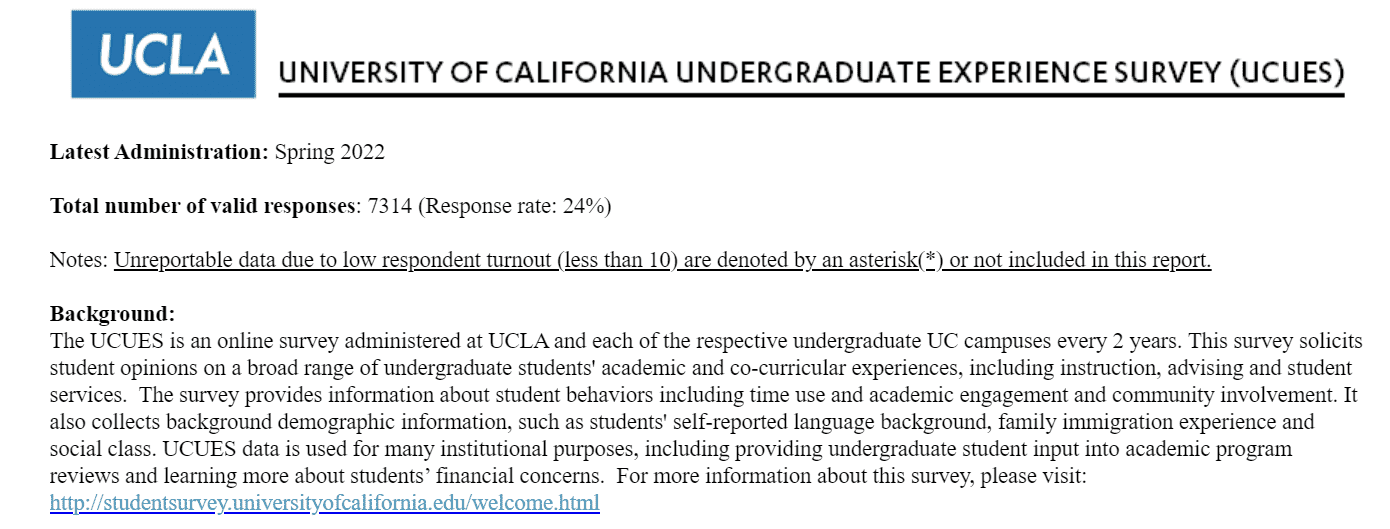
It it not enough. None of what was prepared for the House Committee was enough. We must go beyond the events of this year to gauge what has to be done. The best gauge is by feedback, what kind of feedback is in place to determine whether the students are adequately trained on Title VI? The University of Caliornia system uses the University of California Undergraduate Experience Survey (UCUES) to solicit “students opinions on a broad range of undergraduate students’ academic and co-curricular experiences, including instruction, advising and student services.” In plain English, its a “long” survey covering a broad range of areas in student life that is optional (fig) and administered every two years. A full explanation can be seen in figure and related demographics are shown in figure. Now, I’m not a statistics major, but I assume the survey must meet some criteria with respect to this subset of data adequately representing all undergraduates. If this were true though it would be perfectly “random”, and already “opting in” on a survey depends on personal circumstances. Also we see in figure, the data skews towards Juniors and Seniors, and where are the gender demographics? Based on their not being there I would assume they’re reflective of UCLA’s gender composition but who knows.
Looking at figure and figure, UCLA data is approximately reflective of the UC system as a whole. This data was processed and presented on the UC Systemwide UCUES site. There’s an interesting drop in response “Total” which is highlighted by the blue box. These questions are most likely “optional”. Now looking at the UCUES data from 2022-2016 (figure and figure) taken directly from UCLA, there might be some insight as to why. “LOD_Percent_Total” are the total number of responses from “somewhat agree”, “agree”, and “strongly agree”, and “star” is the percent of total responses composed of this total. We see that in three of the last four surveys, the question “Channels for expressing discrimination or harassment complaints are readily available to students at UCLA” the results are mediocre and the “star” column indicates the question was mandatory. The purple data shows that in 2022 they made the question “optional” and got a 6% approval boost from the survey before. We also see that, since 2016 the question “At UCLA, I have been excluded…” has not improved, and was also mandatory. It looks like in 2022 UCUES removed the question all together.
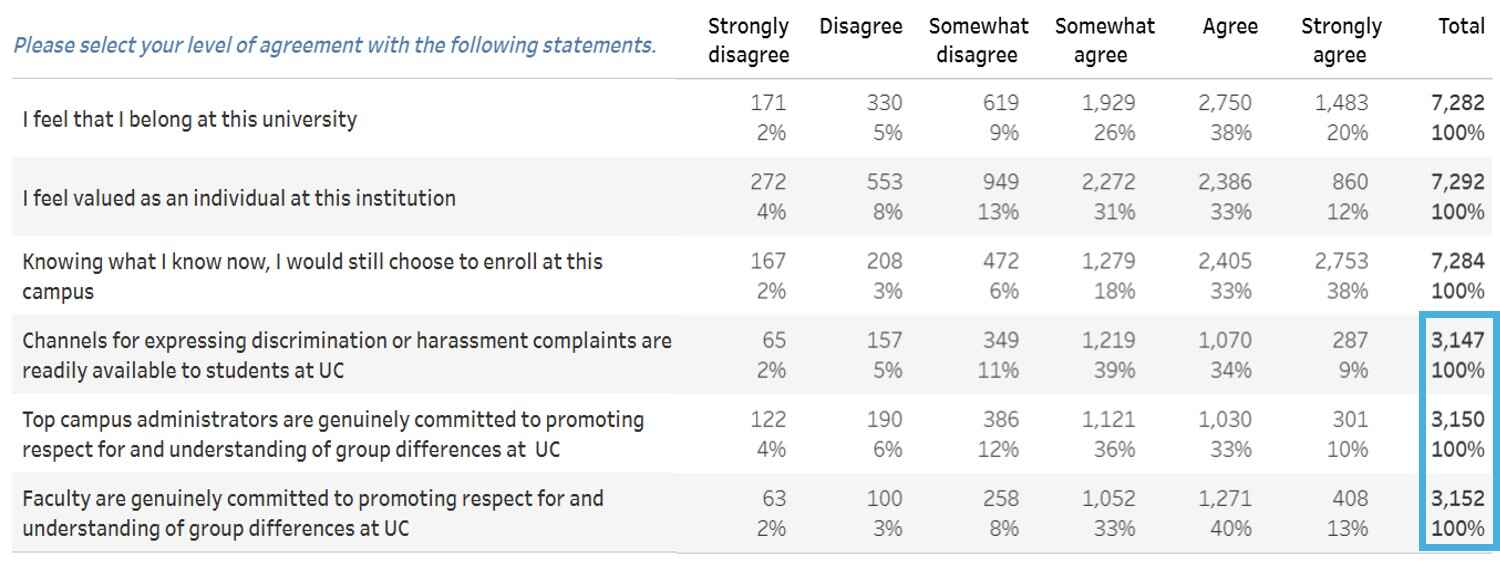
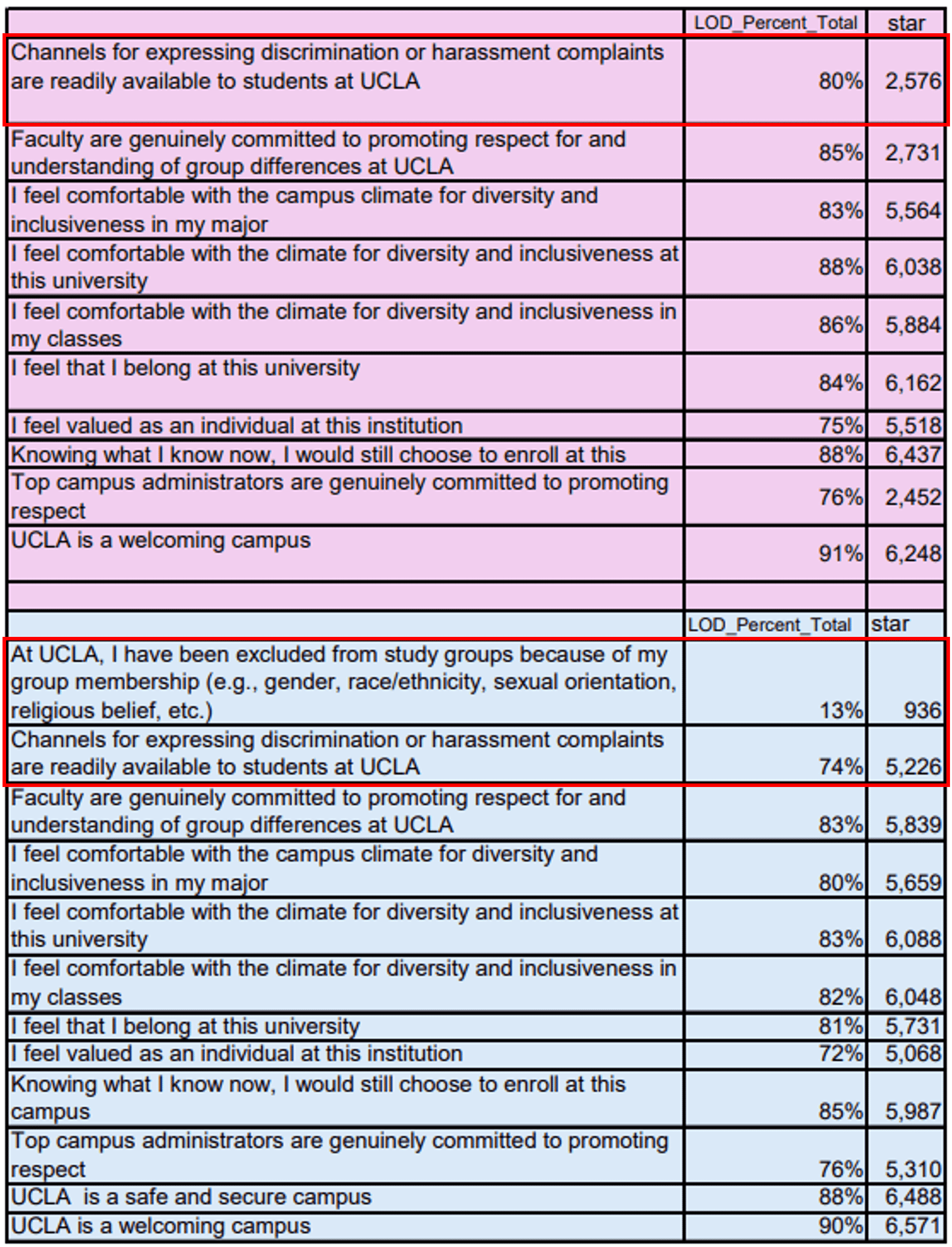
The issue I take with this survey is the same issue I take with trying to train students at orientation. Long, arduous processes make us tired, and we zone out and don’t care. Freshman are more worried about surviving their first days at university I’m sure they are not thinking about civil rights, and with all that gets piled on them during orientation there’s no room left to learn about it anyways. The students should be trained annually, like Title IX, and it should be mandatory. When it comes to these surveys, when they are long and many questions are mandatory, you skip all the optional questions just to get through it. But as we see in the distinction from 2016, 2018, and 2020, to 2022 mandatory questions give greater insight. We can then assume that mandatory surveys would give greater insight still. The UC System should have a mandatory, annual, dedicated civil rights survey covering Title VI and some aspects of Title IX. I have an example here37. The survey needs to be separated from the other surveys on campus life so that students are not tired and “over it”; so that they’re in the right mindset.
-
Jewish students express concern over antisemitism on ucla campus ↩
-
Student organizations host rally demanding UCLA divest from Israel ↩
-
Chancellor Gene Block addresses incidents of bigotry on campus ↩ ↩2
-
UCLA releases statement on antisemitic character displayed at UC Regents meeting ↩ ↩2
-
UCLA Task Force on Anti-Palestinian, Anti-Muslim, and Anti-Arab Racism ↩
-
Jewish Bruins express concern over antisemitism on campus ↩ ↩2
